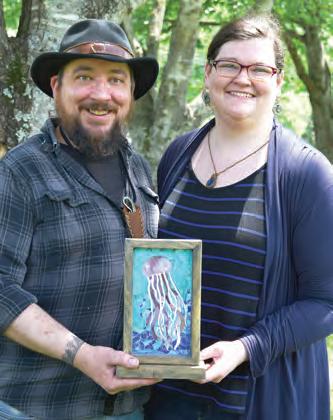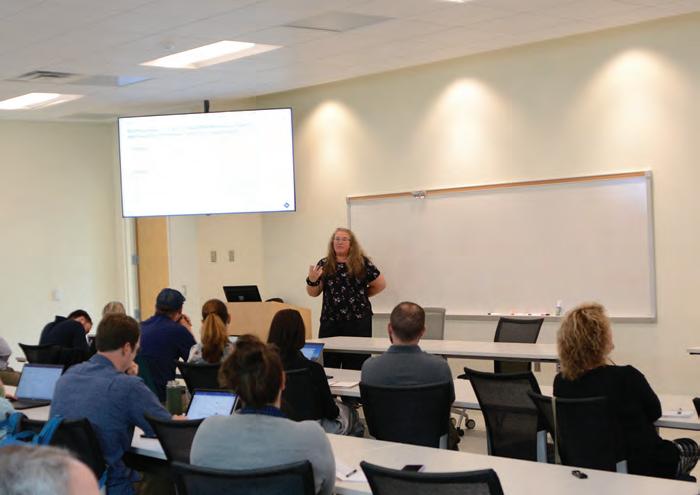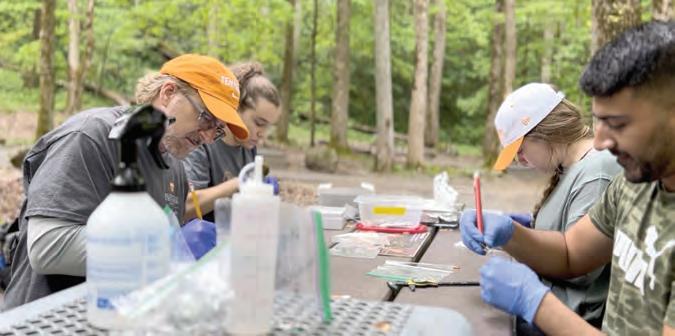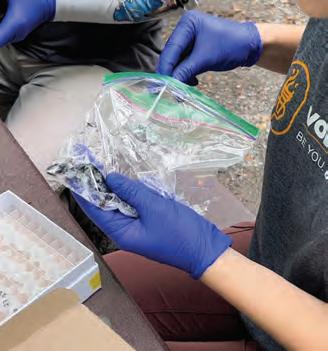




On the Cover:
It’s been over three months since Pactiv Evergreen announced the closure of its Canton paper mill. Now that the massive industrial site has gone quiet, the Smoky Mountain News has delved into the potential short-term and long-term environmental impacts. (Page 12) Jeffrey Delannoy photo
News
Macon GOP precinct chair threatens to censure commissioners........................4 Jackson accepts grants to fund substance abuse recovery planning................5 Haywood School board approves property acquisition..........................................6 Macon leaders sign agreement on high school..........................................................7

Waynesville company sues President Biden’s Labor Department........................8 Jackson reworks plans for domestic violence shelter............................................11
WCU's Kofi Lomotey receives Lifetime Achievement Award..............................17 Business briefs....................................................................................................................19
Opinion
A new day dawns for young Melvin ............................................................................20 Quirkiness attracts, at least in my marriage..............................................................21
A&E
Fourth of July in the Smokies..........................................................................................22
A deep dive into darkness and redemption..............................................................37
Outdoors
Statewide mapping effort aims to prevent future floods........................................38 Word from the Smokies: An Annual Checkup for Salamanders........................42
Amanda Bradley.
Sophia Burleigh.
C LASSIFIEDS: Scott Collier. .
N EWS E DITOR: Kyle Perrotti.
WRITING: Holly Kays.
Hannah McLeod.
Cory Vaillancourt.
Garret K. Woodward.
ACCOUNTING & O FFICE MANAGER: Jamie Cogdill.

D ISTRIBUTION: Scott Collier.
C ONTRIBUTING:

WAYNESVILLE
P: 828.452.4251 | F: 828.452.3585
SYLVA
P: 828.631.4829 | F: 828.631.0789
susanna.b@smokymountainnews.com
sophia.b@smokymountainnews.com

classads@smokymountainnews.com
kyle.p@smokymountainnews.com
holly@smokymountainnews.com
garret@smokymountainnews.com
classads@smokymountainnews.com

Whether it’s a honeyde
a distinct line between people with savory dishes and others though of course there are their









muskmelon,



ew, cantaloupe, watermelon, muskmelon,

ople who like them with a sprinkle of salt and hers who enjoy them for their sweetness –e some who like their melons both ways.
you may enjoy melon with mozzarella cheese or in a capr instead of tomato, added to slice of prosciutto or ham.
a sprinkle of salt, on a skewer with version of a caprese salad with melon to cottage cheese, made into a salsa to top
chunks added to a fruit salad, pureed in a smoothie or drink, made into popsicles or just a simple slice as a dessert.
T To o pick your perfect melon:
• Find one that feels heavy.
• Check the skin to make sure it has no major imperfections and is relatively smooth.


• Do the smell check – it should smell slightly sweet.


 McGrath, RDN, LDN
McGrath, RDN, LDN

The Macon County GOP is poised to take action against one of its precinct chairs, Rob Tolp, after he sent emails threatening to censure four of the five Republican members of the county’s board of commissioners.
This latest round of infighting comes on the heels of recent party squabbling that seems to have been subsiding.
The emails at issue expressed Tolp’s frustration regarding the board’s June 19 passage of the county’s 2023-24 fiscal year budget. The budget passed 4-1 with Commissioner John Shearl acting as the lone dissenter. Tolp’s issue with the budget was a perceived tax increase; however, while the budget amount was about 9% higher than last year’s, the revenue-neutral tax rate was actually lowered significantly from last year.
The Smoky Mountain News obtained copies of the emails sent to two of the commissioners, and the language is the same in both other than the names. Those emails note that Tolp and “many Republicans” who supported those commissioners during their campaigns are “angry and feel betrayed.” No elaboration is provided as to who the other aggrieved Republicans are. Tolp added that the budget, which lowered the tax rate from last year’s 40 cents to 27 cents per $100 of property valuation — the lowest of the state’s 100 counties — was not fiscally responsible and didn’t promote limited government.
“Those are two of the main pillars of Conservativism which you violated with your vote,” the emails read. “The people who placed you in office with their vote and their money did NOT send you there to do that … you betrayed them, like Judas Iscariot betrayed Jesus.”
The email goes on to threaten censure and potential expulsion from the party for commissioners Danny Antoine, Gary Shields, Paul Higdon and Josh Young.
“Once again, a Republican turned into a Progressive liberal on fiscal matters when they were elected to office,” the emails read. “Your actions are disgusting and you owe everyone who voted for you and donated to your cam-
Harris Regional and Swain Community Hospital recently announced that Missi
paign a huge apology for your betrayal … Every Republican on the Board of Commissioners other than John Shearl is a disgrace to the Party and the voters who placed them there. Congratulations.”
Notably, at least one commissioner, Josh Young, didn’t receive any donations.
The turmoil surrounding the budget has been palpable throughout the process. It was first presented to the board in May. At $64.5 million, the first draft of the budget represented an increase of 9.3% — or $5.5 million — over the previous year but didn’t pull any money from the fund balance, which sits at a healthy 68% of annual operating expense. For reference, neighboring Swain County’s fund balance is about 16% of its annual operating expense.
An SMN story published after the budget was passed notes that one of the ways the commissioners looked to lower the overall budget was to reduce pay increases for county employees. The proposed budget included a one-step advancement in the pay scale for all employees and a 3% cost-of-living adjustment. The Southwestern Commission published a study that indicated the average COLA and merit increases for counties and municipalities in the western region of the state to be 3% and 1.8% respectively.
“The 3% COLA, one step, averaging 4.5%, me personally, that’s too much,” said Higdon. “I’m good with 2%.”
During the June 19 budget workshop, Commissioners Danny Antoine, Josh Young and Gary Shields expressed their support for county employees and keeping the raises in the budget. While Shearl agreed with Higdon on reducing pay increases, Young argued for keeping the increases because of how inflation is affecting families. County Manager Derek Roland said he believed those raises were “probably the most critical piece of the budget.”
“I realize that no matter how much we talk about capital improvement, no matter how much we talk about anything, none of that’s possible without being able to continue recruiting and retaining highly qualified employees,” Roland said.
Shearl ultimately made the motion to pass a budget he was proposing that would have dropped the tax rate to about 26 cents. Higdon voted in favor of that budget, but the other three
commissioners didn’t, and the motion failed. Although Shearl continued to push for the lowered tax rate, Roland cautioned against it.
“I can’t in good faith say to go below the number that myself, the financial advisor and our finance officer — at 27 cents, revenue neutral, the lowest tax rate in the state — that we based our capital expenditures on,” Roland said.
The final budget with the 27-cent tax rate was passed after a motion from Young. Shearl voted against that budget while the other four commissioners voted in favor. Such was the impetus for Tolp’s email.
It wasn’t the first time Tolp has shook up the party in recent months.
In an email to fellow Republicans regarding the indictment of former President Trump in New York, Rob Tolp, who only moved to the area from Florida in 2022 and now serves as the East Franklin precinct chair, made his feelings clear.
"I want to encourage each of your [sic] to send an email out today demanding a public response from Senator (Kevin) Corbin and Representative (Chuck) Edwards,” that email read. “Weak Republicans who are afraid to get involved with important issues are why we have a Biden administration able to do what it has done for nearly the past 2.5 years."
Edwards defeated incumbent Madison Cawthorn in the NC-11 primary and now holds that seat while Corbin is highly regarded in Raleigh and serves as the chair of both the Health Care and Appropriations on Health and Human Services Senate committees. He also has high ratings from conservative think tanks such as the American Conservative Union and NC Free.
SMN obtained Young’s and Shields’ responses to Tolp’s email. Young was blunt about his feelings regarding Tolp.
“Looks like I am not getting your vote next time,” Young’s email reads. “Nor would I like it.”
In an interview with SMN, Young said he didn’t even know Tolp, who only secured his seat as precinct chair with the help of longtime Macon County Republican John VanHook — the same man who held a clandestine meeting at his law office where plans were discussed to
usurp the party’s planned leadership at the March convention. That plan was ultimately successful.
Young stands by the decision to pass a budget that gave raises to county employees.
“The county government is one of the largest businesses in the county, period, and it deserves to be run like a business,” he said. “I believe in capital investments and our taking care of our most valuable asset, which is our employees.”
“I feel like I put a lot of time into this budget in speaking with department heads,” he added. “And we had conversations that were about processes and procedures that have taken me years to accumulate the background info for.”
Shields also responded directly to Tolp in an email. Compromise has been a hallmark of Shields tenure as commissioner, even with Democrats who were on the board up until last year. A moderate Republican who describes himself as politically “purple,” Shields said in the email that he believes “mutual respect” is paramount when conducting county business.
In an interview with SMN, Shields said Tolp’s email didn’t upset him much — other than the part that compared him to Judas — but that he worries that such an incendiary email can create division on the board, and that can make it tougher to get things done.
“It disrupts the rhythm you’re supposed to have when you’re in a negotiation,” he said.
Shearl said that while he disagreed with the budget and voted against it, he has “no hard feelings” toward the other four commissioners. Shearl even shook Young’s hand directly after the motion to pass the budget with the 27-cent tax rate and raises for county employees succeeded.
“I think once this settles down it’ll go away and we’ll move on again,” he said.
Commissioners Antoine and Higdon could not be reached for comment.
While it seems unlikely that Tolp will be successful in his quest to use his own position as precinct chair to censure four sitting commissioners, he has now found himself in hot water with his own party. In a brief interview with SMN, Macon GOP chair Jimmy Goodman made his feelings clear.
“Macon GOP does not support this letter in any way and will be taking further actions,” he said.

It’s unclear what those actions will be or when they will be taken. Tolp did not respond to multiple requests for comment.
Bowman has been recognized as the facility’s 2023 Mercy Award winner. The Mercy Award recognizes one employee from each of Lifepoint Health’s facilities who profoundly touches the lives of others and best represents the spirit and values on which the company was founded.
Bowman has been employed as a regis-
tered nurse at the hospitals since 2017. According to a press release sent out by the hospitals, her passion and desire to learn and grow in the nursing field is evident. Within a year of hire she was selected as recipient of the Daisy Award after receiving a touching nomination for the compassionate care she provided for a Hospice patient and
providing much needed reassurance for the family members.
Each facility winner, including Bowman, will be considered for Lifepoint’s 2023 companywide Mercy Award. The companywide winner will be announced this summer and honored during a ceremony in Nashville in August.
“The county government is one of the largest businesses in the county, period, and it deserves to be run like a business.”
— Commissioner Josh Young




 BY HANNAH MCLEOD STAFF WRITER
BY HANNAH MCLEOD STAFF WRITER

Jackson County has received a grant from Dogwood Health Trust to create a substance abuse recovery planning program over a two-year period.

In partnership with the Medication Assisted Treatment program through the Jackson County Detention Center, the county hopes to create a masterplan to determine the best way to spend its $3 million in opioid settlement funds.
“There will be a whole planning process starting next year that’ll have multiple stakeholders involved, and there’s money in this grant to allow for a true, good planning process to take place,” said County Manager Don Adams.

North Carolina Attorney General Josh Stein announced a $26 billion settlement in July of 2021, after litigation resolved the role of four companies in perpetuating the opioid epidemic. Of the $26 billion sum, 85% is going directly to counties and municipalities and 15% will go to the state. As part of that settlement, Jackson County is set to receive $3 million over the course of 18 years. The county received its first installment last spring.
In order to determine the most effective way of spending this money, the county applied for a $368,429 grant from Dogwood Health Trust to create a substance abuse recovery planning program intended to last two years. The money will pay for one full-time substance abuse recovery coordinator position along with all associated fringe benefits. It will fund office space, supplies, operation costs, travel, training, mileage reimbursement and equipment costs. There is also money to pay for consulting services, temporary services and part-time assistance as needed.
“That’s going to allow them to go out and hire some facilitation companies to help put on these community wide processes to help develop the master plan,” said Adams.
Earlier this year, the Jackson County Sheriff’s Office applied for a grant to fund a Medication Assisted Treatment program in the county’s detention center. The grant is available through the North Carolina Department of Public Safety, and Jackson County will receive $493,788. The money will go toward employee expenses, contracted services and medical supplies.
Medication Assisted Treatment is a treatment for alcohol and opioid dependance that combines the use of prescription medication with counseling, peer support and education. While the Food and Drug Administration has approved different medications to treat alcohol and opioid use disorders, the grant program is

approved only for Vivitrol.







Vivitrol, which is sold under the brand of Naltrexone, is a non-opioid medication that safely treats alcohol and opioid use disorders as an opioid antagonist. It is non-addictive, non-narcotic, blocks the subjective effects of exogenous opioids and reduces cravings for people with alcohol use disorder. It is administered once a month via intramuscular injection. According to Jackson County Sheriff Dough Farmer, there will be a series of six shots available to those who opt in.



Five people have died while incarcerated in the Jackson County Detention Center over the past eight years, the most recent occurring in November of last year. Autopsy results for Eddie Columbus Taylor, who died while incarcerated in June of last year show that he died as a result of an overdose. Information in the medical examiner’s report suggests that Taylor may have been dealing drugs within the detention center.





“These two programs will partner

together to try to provide substance abuse treatment for incarcerated persons, but also enhanced treatment for when they’re released,” said Adams. “It will also try to build out programming that’s not just for the released inmate; it will be programming for the entire county. So with these two grants combined, hopefully we’ll be able to do that and then create an overall master plan within the year to start prioritizing where those funds need to be expended long term.”
Adams plans to bring the two job descriptions to the county commission during its July 11 work session so that the board can review and approve the positions later in July. After that the county will be able to advertise those positions and get the programs started as early as August.

“I would like to extend my appreciation to Sheriff Farmer for the work he put in for the grant for the MAT program,” said Adams.
The board approved both grants unanimously.

The Haywood County School Board has approved the acquisition of a parcel of land off Ratcliff Cove Road for the construction of a facility that would consolidate several of its auxiliary services.

“The reason for the interest in Ratcliff Cove is that it is central to all of our facilities,” said Trevor Putnam, superintendent of Haywood County Schools.
meetings.
Both the information technology department and Central Haywood High School used to be housed at the Education Center complex in Clyde — also home to the board of education and the current boardroom — but both were severely damaged in the flooding caused by Tropical Storm Fred in August 2021. The boardroom received minimal damage and was operational shortly after flood waters receded. However, partly
time, that helps with the amount of fuel needed to travel between facilities and schools.”
The property also has sewer and water, as well as a North Carolina Department of Public Instruction fiber optic line that runs within half a mile of it, which means the state will pay for the school system to connect to the fiber.
The parcel of land was previously zoned for low- to medium-density residential development only. However, the Waynesville Planning Board recommended the Waynesville Town Council rezone the plot to create a mixed-use overlay which would allow for live-work units, financial and business support services, laundry services, funeral homes, personal services, general commercial establishments of less than 100,000 square feet, gas stations, restaurants and government services. The recommendation came with the stipulation that the mixed-use overlay only become effective if and when the school system takes possession of the land.

The current asking price on the property is $1.85 million, but in talks with the property owners, the school system is looking at paying around $1.68 million.
Haywood County Schools has approximately $2.5 million in North Carolina Emergency Management Funds, of which about $800,000 will go toward the purchase of this property. Because this money is set aside exclusively for flood reduction mitigation, which includes relocating services and infrastructure impacted by the flood, the school system has to show that it is using the money specifically for services affected by the flood.
state sales tax. The school system uses the capital fund balance to pay off general obligation bonds on elementary schools built in the 1990s and early 2000s, to make repairs and complete small capital projects throughout the year. This pot of money cannot be used for operating expenses such as salaries.
The rest of the $2.5 million can be used on the buildings themselves and site work for the portion of the project that involves IT, as well as the board room.
The Smoky Mountain News previously reported that Rep. Mark Pless, R-Haywood, has advocated for moving school system operations in Clyde away from the Pigeon River where they currently stand.
Pless has said he’s seeking $20 million from the General Assembly for a replacement for Central Haywood High School, which used to occupy part of the site in Clyde, but that he’s not been asked for any money for the consolidation effort and doesn’t plan to ask House leadership for any right now.
According to Putnam, with the availability of space in the Central Elementary building, the school system is hesitant about expansion in the form of a new school building.
“The reason for the interest in Ratcliff Cove is that it is central to all of our facilities.”
“With the mill closure and declining [average daily membership], we didn’t feel like an expansion at this time was prudent,” said Putnam. “We already have large enough, adequate class space for the enrollment that we have. So we didn’t really want to expand that until we could see if enrollment continued to decline and what impacts the mill might have.”
The school system plans to use the 29acre property to house four central services that are currently located in separate areas of the county. A school bus garage and maintenance facility that is currently located on Francis Farm Road, food and nutrition services that is based at the old Crabtree School, the information technology department that is working out of the old Central Elementary School building in Waynesville and the boardroom where the school system hosts training and the board of education holds its
Around 6:30 a.m. June 22, a Haywood County ambulance based out of Bethel lost control on a curve in a wet road and rolled down an embankment in the 700 block of Kim’s Cove Road.

Both paramedics on board were uninjured. The ambulance came to rest at the
because repairs would have been so expensive, and partly because the Pigeon River is so likely to flood again, the school system decided to relocate the information technology department and Central Haywood High School. Both are now located at the old Central Elementary School building.
“If you take off from the Ratcliff Cove property, the maximum travel time you will have to any of our facilities is 15 minutes, with the exception of Meadowbrook,” Putnam said. “That helps with response
bottom of the embankment near a home, and thankfully, no one in the home was injured. There was no structural damage to the home and minimal damage to the property.
The ambulance was en route to an emergency call on Bunny Run Road in the Dutch Cove area at the time of the accident. Another ambulance was quickly dispatched to the original call.
The wrecked ambulance was one of the older ambulances in Haywood County’s fleet and was typically used as a spare.
In the case of this project, two out of four services that are planned to be installed on the property — information technology and the board room — were impacted by the flood and warrant relocation.
“If you look at the footprint, we had some preliminary sketches, approximately half the property will be used to house those facilities that we wish to relocate,” Putnam told the board of education during a June 19 meeting. “Therefore, we’re eligible to use about $800,000, which is half the cost of the property, toward the purchase.”
The rest of the cost of the property purchase will come from the school’s capital fund balance which is generated through
Putnam said that there is already enough classroom space for students enrolled at Central Haywood High School and that if IT were to move to the prospective Ratcliff Cove location, Central Haywood would have access to the entire campus.
To this point, the school system has worked with Civil Design Concepts to verify that the property is suitable for a building that could accommodate information technology infrastructure, as well as the boardroom, in addition to nutrition services and the bus garage and maintenance facility. Those plans are not exhaustive, and more design work will have to be done in the future. The board approved the acquisition unanimously.
The Macon County Commission unanimously approved a memorandum of understanding with the Macon County School Board this month concerning the new Franklin High School. While some commissioners are hesitant about the project, the possible infusion of grant money could bring a majority on board.
“This is a commitment to grant funds, if our county were to receive them,” said Commissioner Josh Young.
Commissioner Young brought the memorandum of understanding before the county commission during its June 13 meeting.
The MOU is with the Macon County Board of Education related to the Franklin High School Project. It stipulates the county’s intent to use any funds received through the Needs-Based Public School Capital Fund for the new high school Project. It ensures elected representatives in the North Carolina General Assembly that Macon County would use grant funds for the new high school.
“What this is, is more or less an agreement that says that if we get the $60 million, that we’ll use it towards construction of a new Franklin High School,” said Young. “It can’t be altered, it can’t go towards other capital needs in the county, it has to go towards Franklin High School.”
The Needs-Based Public School Capital Fund was established to assist counties with their critical public school building capital needs. Grants are funded with revenue from the North Carolina Education Lottery. Grant funds are available to eligible counties for construction of new school buildings and additions, repairs and renovations of existing school facilities.
The school board previously approved the MOU.
“It’s very important that these boards agree to move on with the Franklin High School Project,” said Commissioner Gary Shields. “And also, we feel this agreement will be an asset to our grant proposal that we hope we get in the form of $50 or $60 million. We want to do everything we can for the evaluators to understand that both boards are in sync with this proposal.”
During the June meeting when the MOU came before commissioners, John Shearl asked whether this agreement would bind the county to the current site where Franklin High School stands and where LS3P has preliminary designs for a new high school, football stadium and track.
“I’m still having a terrible time thinking that we’re going to tear down seven perfectly sound structures for this new school project,” said Shearl. “I’m not saying that we don’t need a new school.”
Shearl expressed concern about committing to the project when plans for the new school have not been finalized.
“That’s the problem I have,” said Shearl. “If we’re going to commit to something — and yes, absolutely the grant is critical to
the needs to build a new Franklin High School — but we don’t have finalized plans yet.”
“No disrespect, but the seven ‘good’ buildings you’re talking about are terrible, the campus is not safe as it is now,” said Shields. “Also, for our ADA students, all seven buildings are in need of repair and upgrading.”
Shields noted that LS3P recommended construction of a new school over renovation of the existing buildings for several reasons — even with full renovations, a campus made up of so many separate parts, each with their own entrances and exits, is inherently less safe for students and staff in the case of an intruder; the number of buildings also creates ADA accessibility issues that are compounded by the differing levels on which the buildings are situated; and several buildings have different plumbing, electrical and even emergency alarm systems that would need to be consolidated.
LS3P found early on in the design process that a full renovation of Franklin High School’s campus would fall short by 89,000 square feet for the target space needed for a 1,200-student school.
In addition to questioning whether repairs could work instead of a brand-new school, Commissioner Shearl questioned whether the current location was the best
option for the school. Shields, previously principal at Franklin High School, said that during his time on the board of education, board members surveyed the county for possible alternate locations and found the current site to be the best option.

“If we get the $60 million grant, we have $42 million in fund balance. We could allo-
whole lot less than $100 million. If they’ll send us $60 million of taxpayer money back to us, this isn’t free money, if they’ll send it back to us, you’ve got my attention on a new school. I’ll concede to that, ‘OK let’s do the school.’”
“We need a new high school, bottom line,” said Commissioner Danny Antoine.
cate $20-$22 million right away. That school is projected to come in $90 and $100 million,” said Young. “There’s been a lot of thought put into this over the years, it’s more or less a compromise, the infrastructure is already in place, the traffic count is already accounted for and won’t change. That’s why I do support this, that’s why I’ve been a part of this the whole time.”
Commissioner Shields also brought up the importance of a quality school for the economic growth of Macon County.
“The first thing professional people want to do when they come into town, they want to see your schools,” said Shields. “This is our chance, people.”
Chairman Paul Higdon said that he is not a proponent of the new school.
“All our schools are non-ADA compliant. A lot of those buildings are in need of work,” said Higdon. “If we’re tearing down buildings because they’re 70 years old, we got a bunch of buildings in the county to tear down, we can’t use that as our sole purpose. ADA compliance can be accomplished for a
The board approved the MOU unanimously. The agreement does not bind commissioners to following through with the high school project; rather, it binds them to use any grant funds received through the Needs-Based School Capital Fund on the high school project only.
During the same June meeting, the board also approved an interlocal agreement with the Macon County Board of Education concerning use of the Higdon property. This is a parcel of land the county purchased across the road from Franklin High School for use by the school system. The tentative plan is to use the property for Career and Technical Education programs.
The agreement stipulates that upon closing of the county’s purchase of the Higdon property, the parties will enter into a lease agreement in which the county will permit the board of education to use the entire property, the buildings and grounds for educational purposes. It also lays out the intent for the county commission and board of education to work together with LS3P to determine what programming can be provided on the site, as well as the responsibility of the board of education for all maintenance and upkeep of the property. This agreement also passed unanimously.
“It’s very important that these boards agree to move on with the Franklin High School Project.”— Commissioner Gary Shields
Waynesville’s USA Farm Labor is suing the federal government in hopes of changing a new rule it claims will cost the company hundreds of thousands, perhaps even millions, of dollars per year.
The suit, which was filed on April 10 on behalf of the company and several of the farms it serves, calls attention to a change implemented by the Department of Labor under President Joe Biden. The defendants are all Department of Labor officials including Julie Su, the current acting Secretary of Labor whose fate will be determined by the outcome of a heated mostly party-lines battle in the U.S. Senate for her confirmation.
At odds is a change to the H-2A visa program.
The Immigration and Nationality Act of 1952 established the H-2 nonimmigrant visa program, and Congress created the current, more specified H-2A program in 1986 to balance the needs of farmers and laborers. It allows farmers who declare that they can’t find domestic labor to hire migrant workers who are approved through a consular vetting process.
The late John R. Norton III, who served as Deputy Secretary of Agriculture under President Ronald Reagan and passed away in 2016, explained to Congress the labor situation when the H-2A program was being established.
“In agriculture, undocumented workers are primarily engaged in seasonal harvest work throughout the U.S,” Norton said. “As we move toward implementation of employer sanctions, we must at the same time prevent labor shortfalls and dislocations which have the potential to disrupt harvests and interfere with the marketing process. The national economy and the American consumer depend upon a stable and adequate supply of agricultural labor to maintain commodity supplies at reasonable prices.”

Cayleigh Phillips is in the process of taking over her retired father’s produce farm in the Bethel area of Haywood County. Her father, Gary Griffith, just began using H-2A migrant workers in the last couple of years. Although Phillips grew up in Canton, after college she moved to the Midwest where she took a job with a company that provides H2A compliant software and services. She said the program is beneficial to farmers because there simply isn’t a domestic labor force willing to do the tough jobs on farms, jobs necessary to put food on American families’ tables.
“The H-2A program is an integral part of being able to produce food and other things the U.S. consumer wants to buy,” she said. “It’s very important that a program like this is set up to keep food prices where people want to pay them.”
Likewise, she said the program is good for workers who are able to enter the country legally for a predetermined length of time and can send money back to family in their home countries. In addition, although
some farms have faced criticism for providing inhumane living and working conditions, the program requires farmers to take several steps to provide for workers’ safety and health.
Philips said navigating the H-2A process can be burdensome and complicated but that having a good agency working on a farm’s behalf makes things go much smoother.
“It can make the process very easy and not as scary if you have a good agent,” she said.
around 2017 when he moved to Kentucky and then came back. He currently works as a technical writer and is also moving into a marketing role. He said many of the company’s customers are midwestern farmers in states with low unemployment rates, such as Wisconsin and Minnesota, who can’t find help. Their options are limited to either handling the labor themselves, which isn’t practical in a lot of farms with larger operations, hiring migrant workers who entered the country illegally or using the H-2A program.
“We are the best option for people who
The company is different from other H2A agents in that it often recruits people with unique skills, such as equipment operators and truck drivers. Such laborers are the point of frustration with the new rule.
The Department of Labor protects the wages of some agricultural workers through the Adverse Effect Wage Rate, which is basically a minimum wage that varies from state to state based on a survey of farmworker wages in each state. This prevents wages of domestic laborers from becoming depressed by competition from foreign workers willing
One such agency is USA Farm Labor, which sits in a nondescript office on Dellwood Road between Maggie Valley and Waynesville. According to the lawsuit, the company is among the top three H-2A agents and submits over 800 applications per year, many of which cover multiple workers. It has a nationwide client base, including the farms who also appeared as plaintiffs below USA Farm Labor in the civil complaint.
Alex Cracchiolo has been with the company since 2015 except for a brief period
want to follow the rules and do things the right way,” Cracchiolo said. “Typically, what we see is we’ll talk to people who say, ‘I can’t find anyone; I’m desperate for workers,’”
USA Farm Labor partners with recruiters in countries all over the world, from Central America to Eastern Europe to South Africa. The exchange rate in countries such as South Africa is advantageous for laborers who send money to their home country from the United States, so these workers’ families stand to benefit tremendously off a relatively short contract.
to work for less. The goal is market neutrality.
In December 2021, DOL proposed a new rule that sought to establish a new wage obligation for those who perform “specialized” duties such as driving a truck. Although DOL accepted comments from farmers and stakeholders such as USA Farm Labor, the proposed rule was finalized as originally written with no changes. The rule, referred to at times in the lawsuit as the “Final Rule,” was published on Feb. 28 of this year. While six occupations — such as field labor, agricultural equipment operator and packagers — will have AEWRs based on the farm survey, other jobs’ wages will be based on the Occupational Employment and Wage Statistics Survey, which the suit claims “does not represent agricultural wages.”
“The Final Rule severs the link between agricultural wages and surveys of wages paid to actual farmworkers,” the suit reads.
Basically, the rule would make it so that if a worker performs a F
“The H-2A program is an integral part of being able to produce food and other things the U.S. consumer wants to buy,” she said. “It’s very important that a program like this is set up to keep food prices where people want to pay them.”— Cayleigh Phillips
task other than the six for even a minute out of one day during their time with a farm, they must be paid at the higher OEWS rate for all their labor.
Many concerns voiced in the civil complaint were first raised in a letter sent to DOL from Wendel Hall, a Washington, D.C., attorney who now represents the plaintiffs. The letter was addressed to Brian Pasternak, a Director of Program Services at DOL who is the administrator over the Office of Foreign Labor Certification.



“While the Department may have discretion, that discretion is not limitless,” the letter reads. “It must engage in reasoned decision making and its conclusion must provide a rational solution. For the reasons described below, the NPRM’s proposal does not.”
The letter notes that having been through the process of determining AEWRs multiple times, such “mistakes” should not be made.




“The NPRM proposal compares the wages paid to movers, chemical haulers, haulers of retail supplies, haulers of construction supplies, and about everything else and asserts, without evidence, that the wage paid to a truck driver hauling nitric acid long distance reflects the market wage for a truck driver hauling a load of grain to an elevator or storage facility three miles away,” it reads.
The letter offered plenty of hypothetical arguments to show why some felt the rule was illogical and cumbersome.


“What happens if the truck driver is sick? The field workers show up. John Doe, a field worker has a CDL, but he cannot be legally assigned to drive the truck. President Biden’s Executive Order and the APA require much more than dismissive irrationalities like the above,” the letter reads.
Ultimately, Hall simply argues that the system works and should be left alone. “if it ain’t broke, don’t fix it,” he wrote.

The civil complaint reiterates much of what was said in the letter and claims. It notes that USA Farm Labor surveyed the farms it serves, and of the farms surveyed, 64% said they’d stop using the H-2A program, 33% were uncertain and 3% said they would continue using it.
“The Final Rule will reduce the income of USA Farm Labor, Inc. by $635,800 to $3M annually,” the complaint reads. “The lower figure is assuming that all uncertain farms and survey non-respondents will continue to use the H-2A program. The higher figure is assuming that the survey results represent likely behavior even for those who did not respond to the survey.”
The complaint says that one farm in Wisconsin already saw the AEWR for the state go up from $15.37 an hour to $17.34, which has in itself proven cumbersome. In addition, under the Final Rule, that farm would be required to pay its workers the truck driver rate of $24.34 because their employees “occasionally” drive grain trucks 12-25 miles away.
The complaint draws a few final conclusions. One, it notes that the new rule undermines the aim of the AEWR to provide a wage that won’t undermine what domestic workers could make. Two, it makes the cost

of producing food higher, which may drive some farmers out of the industry altogether, which can increase overall food insecurity. Finally, it would incentivize farms to hire people who are in the country illegally since they can be paid lower wages under the table.
“Even if Plaintiffs could pass on increased costs (to consumers) the Final Rule fails to consider the reliance interests consumers have in reasonably priced food,” the complaint reads. “Passing increased costs on would force many people on the margins into hunger.”
Cracchiolo said the rule change has been on their radar since 2019 when something similar was discussed; that dispute ultimate-
ly ended in a two-year wage freeze. Once that freeze was up, the Final Rule was proposed.

“It popped back up with the Biden administration, and we were like, ‘hold on, this is not over yet,’” he said. “This all of the sudden throws a wrench in a lot of the H-2A stuff. We were immediately like, ‘this is going to be disastrous for the program.’”
While DOL has suggested that 98% of farms will be unaffected by the rule change, Hall’s letter to Pasternak and the lawsuit both claim that number doesn’t come close to showing how many will actually be hurt by the change. Cracchiolo agreed.
“Everything we’ve seen suggests otherwise,” he said. “We think they’ve grossly underestimated that number. It’s not that the farmers are trying to be stingy and not pay people what they’re worth, but most people we work with can’t afford to pay more.”
The suit calls for injunctive relief preventing the DOL from implementing or enforcing the rule, an order vacating and setting aside the rule, a declaration that the rule is unlawful, court costs and attorney fees.

Multiple DOL officials didn’t respond to requests for comment from SMN. SMN also reached out to Farmworker Justice, which has vocally supported DOL’s rule change, but did not hear back.
From porcelain veneers, crowns and bridges to facelift dentures and dental implants, Dr. Highsmith can transform the appearance and restore the health of your smile.



It’s a smile that people will notice. But more importantly, it’s a smile that will help you look and feel your very best.
All restorations and lab work by North Carolina’s only AACD accredited lab technician.





828.634.7813

Jackson County has had to rework the design for its domestic violence shelter after cost estimates came in well over the amount the county had budgeted for the project.
During its June 20 meeting, the county commission heard presentations from County Manager Don Adams and Clark Nexsen Contractor Chad Roberson about the increase in price. Adams had previously come before the board looking for additional funds to construct an 11-room domestic violence shelter rather than the nine-bedroom shelter that had originally been designed. However, shortly after that request to the board, Roberson received bids on another project that allowed his team to more accurately estimate the cost of construction for the domestic violence shelter in Jackson.
“When he received those estimates, it drastically increased the cost of the facility,” said Adams. “And when I say drastically, I mean over $1 million from the last time we had a conversation.”
Due to the increased cost estimates, the Center for Domestic Peace and Jackson County went back to the architect and looked at more design options.
“We feel like we’ve come back with a proposal that works,” said Adams.
In order to avoid the additional $1 million and create a project more in line with the original budget, the county has opted for a design that reverts to the original ninebedroom plan which allows for an occupancy of 18 people. The revised plan still contains larger rooms that were part of the 11-room design.
According to Adams, the Center for Domestic Peace is satisfied to move forward with the revised design. The new plans have also been presented to Dogwood Health Trust, which is providing matching grant funds for the project, and the nonprofit is comfortable with the nine-room design even though the county had previously asked for additional funds when it proposed constructing 11 rooms in the building.
Roberson presented the revised schematic design to the board during the June 20 meeting in order to receive approval to move forward. In addition to nine bedrooms, the shelter will contain two floors, an outdoor area that is inside the protective fence that will encircle the property, a secure processing area, bathrooms that are accessible to those with disabilities, connecting rooms for larger families, kitchen space, staff offices
and lounge areas on both floors.
“If you guys have visited this site, it’s a very small site, so we’re trying to capitalize on the site as much as we possibly can,” said Roberson. “We visited a number of spaces around the region here and gathered a lot of information and got input from Wes and his team there as well, so a lot of this information is coming from those interfaces.”
“We’ve gotten preliminary approval of this site design for fire protection,” said Adams. While the latest version of the shelter fits within Jackson County’s budget, it is a couple hundred thousand dollars short of being fully funded. However, the Center for Domestic Peace and Jackson County staff feel confident they will be able to fundraise and/or secure grants for the remaining money. Furnishing the building and equipping it with the technology it needs account for the majority of the funding gap.

“And remember these are estimates; we don’t know what the numbers are until you actually open the bids,” said Adams.
CDP and Jackson County have already applied for a $250,000 grant to go towards the additional funding needed for the project.


“This is the end of the schematic design phase, so we will be moving into the design development and construction document phase. That’s the bulk of where the details will be refined and we’ll be getting that ready to go out onto the market for bidding,” said Roberson.
The site for the project — behind the Cook Out located on N.C. 107 — was donated by Mountain Projects, but the land still needs to be officially handed over.
“We are finalizing a survey of this property line. So once that survey is complete then we can proceed forward with Mountain Projects as far as transferring that property over to Jackson County,” said Adams. “Then ultimately, we’ll need to have that property transferred over to Jackson County before we actually begin construction as far as ownership goes.”
The county has just over $4.6 million set aside for the domestic violence shelter, half of which is grant money from Dogwood Health Trust.
“We feel comfortable requesting to move forward with this project with the understanding that we’ll fundraise for this,” said Adams.
The board unanimously approved the plans for the domestic violence shelter.
“We feel comfortable requesting to move forward with the understanding that we’ll fundraise for this.”
— County Manager Don Adams

The paper mill has been closed for years now, but the cleanup is ongoing.
Shortly before the plant shut down, a group of fishermen found a dark substance seeping out of the riverbanks. It was black liquor, a caustic byproduct of papermaking that is extremely toxic to both humans and aquatic life. The discovery spurred a year of litigation that ended in March 2021, with the company agreeing to pay $650,000 in fines — and to clean up its mess.
So goes the story for Luke, Maryland, a tiny town of 85 just down the Potomac River from the larger small towns of Piedmont, West Virginia, and Westernport, Maryland — populations 700 and 1,800, respectively. Built in 1888 by Scottish emigrant William Luke and his sons, John and David, the mill was a mainstay employer in rural Western Maryland until April 30, 2019, when its owner, Verso Corporation, announced that in just one month, production would cease forever.
It's been four years since the mill’s nearly 700 employees clocked their last shift, and the industrial complex that was once the town’s lifeblood remains idle. But the community is still working to hold Verso accountable for the environmental toll it left behind.
“They’re still in the process of mitigation,” said Brent Walls, Upper Potomac riverkeeper for the Potomac Riverkeeper Network. “They’re still in the process of
pumping out groundwater and cleaning it, and they have excavation plans to remove contaminated sediment.”
Environmental recovery from 135 years of riverside industry has been far from immediate. But four years out from the closure, the improvement is obvious. The “chocolate” discharge from the mill is gone, leaving the stream “clear as a bell,” Walls said. The mill closure, together with aggressive treatment for acid mine drainage that had also affected the area, is remaking both the river and the economy.
“You're seeing a huge explosion of species,” Walls said. “Fishing is just the economic driver for that area now.”
As Luke navigates the middle chapters of its comeback story, Canton is still in the early pages of what promises to be a similar tale. On March 6, the 1,200 employees of Canton’s 115-year-old Pactiv Evergreen plant found out the mill was closing for good.

The last shift ended June 8, ushering the region into an unprecedented period of dazed transition. The next chapters of Canton’s story will deal with questions about economic stability and cultural identity in a post-papermaking world — but also with the mill’s environmental legacy, and what it means for the region’s future.
Like the mill in Maryland, the Canton mill has left behind some messes.
Currently, there are two active cleanups onsite resulting from issues with aboveground storage tanks. The first, discovered in February 2021, was a release of gasoline from an underground pump supply line from a tank. A 1-foot-thick layer was found during groundwater sampling in a nearby
monitoring well. Oil containment booms were deployed, and three monitoring wells were installed. Pactiv Evergreen must continue operating then until contaminant concentrations fall below regulatory standards.
The second was a release of No. 6 fuel oil that was observed on the Pigeon River in June 2021. The source was determined to be either a tank or transfer line on site. Oil booms were deployed, and a firm engaged for a subsurface investigation. But in August 2022, an oil sheen was once more observed on the river, presumed to be from the same source. A 466-page workplan filed June 15 outlines a schedule of sampling and analysis for this summer, with a technical memo to be submitted in October.
These aren’t the only ongoing environmental issues associated with the mill. In January 2022, the mill’s environmental staff found black liquor — the same toxic substance that triggered the lawsuit in Maryland — in the Pigeon River. It’s associated with an old groundwater seep, which received its first notice of violation back in 1994. The Division of Water Quality has issued notices of violation to both Pactiv Evergreen and the mill’s previous owner International Paper in connection with the issue.
Pactiv Evergreen’s decision to cease operations in Canton doesn’t absolve the company from its responsibility for environmental issues associated with the mill. It must continue to abide by the rules contained in the numerous permits it holds, including landfill, wastewater treatment, stormwater and discharge permits. Requesting to transfer or terminate the permits would trigger separate processes.

But Walls said his experience with Verso has shown him that it’s up to grassroots
organizations and the local community to hold the company’s feet to the fire.
“That’s why we headed the lawsuit, because we wanted to make sure that the state didn’t fold or didn’t cave,” Walls said.
The State of Maryland later joined the Potomac Riverkeeper Network in the Verso lawsuit.
N.C. Department of Environmental Quality Secretary Elisabeth Biser has made some strong statements about her intention to ensure Pactiv Evergreen lives up to its responsibilities.
“The DEQ’s role in this is to hold the responsible party accountable, to make sure that the right steps are taken, prevent further impacts to the town and residents and also first and foremost to make sure that the site is remediated for future productive use,” she said during a May 2 roundtable discussion with local leaders. “We will hold the company accountable for responsible closure.”
While that may be encouraging to hear, it doesn’t mean the local community should let its guard down, Walls said. Sometimes states will talk a big game but then “fold quite easily,” allowing industry to get a pass.
“It’s not a sure thing,” he said.
Ensuring the state develops a quality site closure plan is key, he said. The plan should include an assessment examining what contamination the mill has left behind. It’s been more than a month since the Canton mill stopped making paper, but the state has not yet completed such a plan. However, the process is underway, said DEQ Public Information Officer Sharon Martin.
“We are investigating the known environmental issues through the appropriate programs and divisions with department-level coordination, as we determine next steps to ensure a full assessment of the site,” she said.
It’s hard to say what that assessment will turn up. The mill has been operating for more than a century, first taking up its place on the banks of the Pigeon River 64 years before the Clean Water Act became law.
“I suspect that there is a long legacy of pretty toxic chemicals just because the bleaching and heat processes involving chlorine would necessarily have produced a lot of chlorinated hydrocarbons, including dioxin,” said Hope Taylor, a chemist by training who has served more than two decades as executive director of Clean Water for North Carolina.
Dioxins are highly toxic chemicals that can cause cancer, reproductive and developmental problems, immune system damage and hormone interference.
The mill used more chlorine during its first 100 years of operation than in more recent years, meaning that earlier operations would have resulted in more toxic byproducts. Taylor said she suspects, but doesn’t know, that some of that waste might be on or near the mill site, which is in the floodplain, but much of it is likely buried in off-
site landfills. These landfills — the oldest of which are unlined — are what she is most concerned about.

“My concern is that the bulk of the sludges … would have been deposited in landfills that were completely unlined for most of the life of the mill,” she said. “It would have been enormous quantities, millions of tons a year would be leaching into the groundwater. I would be concerned about anyone who was on wells in that area.”
Walls said he would also be concerned about coal ash. Though the Canton mill was running on natural gas at the time of its closure, for most of its history, it was powered by coal. Since the mill opened its current landfill facility in the 1980s, coal ash has been stored into a lined landfill “heralded for its state-of-the-art design and high-caliber engineering,” according to a 2014 story from The Smoky Mountain News. However, mill waste has not always been stored to such high standards.

At its current landfill, Pactiv Evergreen is permitted for an average annual waste disposal rate of 450,000 cubic yards per year on the 244-acre property just south of U.S. 74 and west of Canton. The permit lists 109.1 acres of landfills on that property, of which 70.6 acres are operational. The remaining acreage is for landfills that have closed after reaching capacity.
Three other landfills are also associated with the paper mill, though not with current
owner Pactiv Evergreen. Champion Landfill No. 1 is an 8.36-acre landfill used from 19601970, Champion Landfill No. 2 is a 78-acre landfill used from 1970-1982, and Champion Landfill No. 3 is a 46.3-acre tract used 19731983. All three are located along the Pigeon River, and all three are unlined.

They have also all been investigated under the federal Comprehensive Environmental Response Compensation and Liability Act of 1980 — more commonly known as Superfund — due to the large quantity of dioxin-containing sludges disposed of there. However, no environmental violations have been noted for the closed landfills, said a DEQ spokesperson. International Paper, not Pactiv Evergreen, is the responsible party for these landfills.
When a landfill closes, the DEQ requires that monitoring wells be installed to check for a host of contaminants leaching from the






site. Regardless of whether it’s still making paper in Canton, Pactiv Evergreen is responsible for continuing to monitor the wells listed in its permit — but only for a certain period. Once a landfill closes, it must be monitored for 30 years in the same way it was while open. If it violates groundwater standards during that time, then the 30-year timeline can be extended. But if no issues crop up, monitoring can cease.
Evergreen Packaging one day go out of business, a situation could arise in which no entity exists to take responsibility for environmental issues related to the mill. In that case, public dollars could end up footing the bill through the federal Superfund program, which is funded through excise taxes and environmental income taxes.
According to a DEQ spokesperson, Pactiv Evergreen has “existing financial assurance” to ensure its ability to fulfill monitoring requirements on its existing, regulated land-
The three unlined landfills that International Paper is responsible for don’t fall under that requirement. Landfills created before 1983 are sampled and monitored only if there are contamination concerns at the site — meaning the onus is on citizens, not the company, to watch for signs of pollution.
Additionally, for DEQ to hold the company accountable, an accountable company must exist. Should International Paper and





fills.
FIn addition to the toxic substances known to be housed in the mill’s landfills, Taylor is concerned that a less-understood class of chemicals called PFAS, or “forever chemicals,” could be there as well. PFAS chemicals are often used to make commercial products stain- and water-resistant. Their components break down extremely slowly over time, and they have been found in the blood of people and animals all over the world, and at
“If you have those chemicals on site, and they have leaked or leached into the ground, then that can be a serious problem.”— Brent Walls, Upper Potomac riverkeeper, Potomac Riverkeeper Network Downstream of the mill, the water is darker and invites much less recreational use than the upstream reach. Holly Kays photo
low levels in a variety of food products and in the environment. The science is still young on how they affect people, but studies have linked exposure to various health issues.
PFAS is often used in the paper industry, especially for food product packaging like that made in the Canton plant.
“I’m assuming there was a lot of it used, maybe not at the Canton mill, but at the Waynesville operation I would be almost certain, even though I don’t have any documentation,” Taylor said. “But because it was so widely used in the food packaging industry, it seems very unlikely that it would not have been used at the Waynesville facility.”
If so, PFAS would also be buried at the mill’s permitted landfills.
“If you have those chemicals on site, and they have leaked or leached into the ground, then that can be a serious problem,” Walls said.
While the assessments to follow Pactiv Evergreen’s departure may reveal new details about the environmental impact the mill had during its lifetime in Canton, initial observations indicate a swift improvement in the downstream water quality following its closure.

Each year, stream sites in Haywood County are given a water quality grade based on sampling performed by Haywood Waterways Association and its volunteers.
In 2022, the Pigeon River below Canton was rated as “poor,” with an overall score of 54.1 out of 100 — even though the river upstream from Canton received a “good” score of 83.3. “D” grades for phosphorus and conductivity, as well as “C” grades for turbidity and ammoniacal nitrogen contributed heavily to the outcome downstream.
While there has been only one round of sampling at the site since the mill closure, results are promising, said Preston Jacobsen, executive director for Haywood Waterways Association. Notably, the river’s conductivity, which indicates levels of metals, dropped in the most recent sampling.
“We’re seeing a reduction in the tannins that’s kind of bringing down the color, and we can in spots now start to see the channel bed,” Jacobsen said. “So all these are good, positive, trending in the right direction indicators that the river downstream of the mill is improving.”
In addition to impacts from the paper mill, the Pigeon River has had to recover from Tropical Storm Fred. When the flood tore through in August 2021, it swept away most of the river’s aquatic life. In its sampling, Haywood Waterways saw large populations of leeches, typically an indicator of bad water quality, move into the river. However, those populations have been declining, and during its most recent sampling no leeches were found, Jacobsen said. To the contrary, during a snorkeling event held in Canton June 15 — the event was held above the mill where the water was not affected by the closure — Haywood Waterways found a hellbender. The giant
salamander is extremely sensitive to poor water quality and had not been found in that stretch of river for years.
When the mill’s impending closure was first announced, The Smoky Mountain News spoke to multiple water quality and fish experts, who predicted that water quality and fish populations would bounce back quickly after production ceased. The Pigeon River is fed by many small tributaries, many of which are clean, healthy and full of aquatic creatures that will readily migrate into the main channel once it’s cleaned up. The river is low enough in elevation that it’s unlikely to be cool enough for trout, said N.C. Wildlife Resources Commission District 9 fisheries biologist Powell Wheeler, but it could become a popular fishery for smallmouth bass, largemouth bass and redbreast sunfish. Luke Etchison, western regional aquatic wildlife diversity coordinator for the Wildlife Commission, is in the process of conducting sampling to determine the clo-
smelly, dark, rash-inducing water downstream. Bahr has always suspected it of adversely affecting the community’s health.
“The smell is still there,” she said. “But we’re very hopeful.”
Each week, CWEET conducts E. coli testing in Clyde that goes into Swim Guide, an online tool people can use to make decisions about where to safely go swimming. There, the water “looks better than I’ve ever seen it this time of year.”
“If that’s an indication, I’m hopeful for what will come our way,” Bahr said.
Bahr remains skeptical that the mill’s impact will vanish completely. The Pigeon River is impounded upstream from Cocke County behind Duke Energy-owned Lake Waterville Dam, and Bahr worries about what’s in the sediment on the lake bottom. What toxic chemicals have settled there, she
The mill inspection report from DEQ flags several concerns. Perhaps the most significant finding was cracks, spalling and seepage on the concrete downstream dam face.
“Due to the age of the dam and number of concrete defects, it is strongly recommended that an analysis be performed on the structural integrity of the dam,” the inspection reads. “Repairs [sic] all cracks and seeps and continue to monitor dam for any increase in cracking, new cracks or seeps and increased flowrate or color change in existing seeps.”
A dam failure would carry high potential for serious property damage and possible loss of life, the inspection states. Should such an event occur, Pactiv Evergreen would be the responsible party so long as it remains the owner of the dam.
“Pactiv Evergreen has not communicated any information on its intentions on future ownership of the dam on their property to DEMLR,” said a spokesperson for
sure’s impact on aquatic life there.
“I would be very surprised if within a year or less of the discharge ending those organisms don’t replenish themselves, just because there’s this new healthy habitat in the main body at the river,” Taylor said in a March interview.
But only time will tell, Jacobsen cautioned.
“I don't want to put the message out there that the water quality is improving without more data to back that up,” he said. “We are data driven. And I'd like to get more monitoring samples behind us before we put that message out there. But yes, the trend is in the right direction.”
Down the river in Tennessee, water quality hasn’t changed much since the mill closed, said Deborah Bahr, executive director of Clean Water Expected for East Tennessee. For more than a decade, she’s been pushing to get the mill to clean up its act, claiming — along with many others in Cocke County — that the plant was sending
wonders, and when might they find their way downstream?
Taylor is a bit less concerned about that, because she believes most of the contaminants have already moved on.
“Right after the hurricanes in 2004, the dioxin concentration in the fish came down very dramatically in Waterville Lake,” she said. “I think there’s a good chance that the huge flows that were coming down the river actually washed a lot of that sediment downstream. While there is undoubtedly still some toxic sediment there, my guess is that it’s been covered by cleaner sediment that’s come down from upstream.”
Upstream from the plant is a second dam, this one owned by Pactiv Evergreen. It holds back Lake Logan, a reservoir the mill used to ensure sufficient flows on the Pigeon River to support its operations. Completed in 1931, the 62-foot dam was most recently inspected on March 9, three days after Pactiv Evergreen announced the mill’s closure.
DEQ’s Division of Energy, Mining and Land Resources.
For more than a century, the life of Canton’s paper mill has been intimately tied to the life of Canton, Haywood County and the larger Western North Carolina region. Its closure is guaranteed to have significant impacts on both the economy and the environment, for years to come.
Some impacts will be as immediate as the disappearance of the white dust that has plagued Canton throughout 2021 and 2022, or the bottom of the riverbed emerging from its cloak of dye.
Others will be slower to move, slower to settle. What will happen to the Lake Logan Dam? Will black liquor seeps continue to be a problem in the Pigeon? And what will the final site assessment reveal about the nowvacant 200-acre mill property?
Only time will tell.
The American Red Cross will host its 36th annual Operation Blood Drive on Thursday, June 29, in Asheville, Hendersonville and Waynesville.

Right now, there is a great need for donations to address a recent drop in appointments that could lead to fewer transfusions for patients in the weeks ahead. Type O blood donors are especially needed to ensure a strong blood supply. Individuals of all blood types are urged to schedule an appointment now to give blood. Appointments can be made by downloading the Red Cross Blood Donor App, visiting RedCrossBlood.org and using ‘OBD2023’ sponsor code, calling 1.800.RED.CROSS (1.800.733.2767) or enabling the Blood Donor Skill on any Alexa Echo device.
Here are the locations to donate blood:
• 7 a.m. to 7 p.m. | Reuter Family YMCA Gym 3 Town Square Blvd., Asheville

• 9 a.m. to 3 p.m. | American Red Cross Henderson County Offices 211 1st Ave. East, Hendersonville.
• 1-7 p.m. | Trinity Baptist Church Gymnasium, 216 Shelburne Rd., Asheville
• 11 a.m. to 7 p.m. | First United Methodist Church Gymnasium, 566 South Haywood St., Waynesville
All presenting blood donors will receive an Operation Blood Drive T-shirt while supplies last. Presenting donors will also be entered into a raffle to win a four-pack of
Cedar Fair tickets at each location. There will also be food donated by local restaurants at each location.
In addition to making and keeping appointments, the Red Cross will help donors prepare for beach days and backyard fun as the season begins. Those who come to give June 1-30 will receive a $10 gift card by email to a merchant of their choice. Plus, they’ll also be automatically entered for a chance to win a backyard theater package including a projector and screen, projector tripod, smokeless firepit, Adirondack chair set and a movie night snack package.

pamelapennywilliams.group@allentate.com












Kofi Lomotey, the Chancellor John Bardo and Deborah Bardo Distinguished Professor of Educational Leadership at Western Carolina University, recently received the 2023 Distinguished Contributions to Social Contexts in Education Research Lifetime Achievement Award from the American Educational Research Association Division G.
Lomotey has been an educator and administrator at every level of education, from preschool to college. He has written more than 50 books, articles and book chapters on urban and black education.

He has committed a lifetime of research, education and administration to racial issues in Black and urban education. His lifetime achievement with the AERA is one of many accolades recognizing his numerous contributions to creating socially just educational institutions.
Lomotey notes mentoring and teaching as his greatest contributions to his field.

“In addition to providing a role model as an administrator over the years, one of my most significant contributions is the mentoring that I do with students, faculty and other administrators. That’s one of my greatest joys aside from actually teaching in the classroom,” he said.
“I take groups to Ghana in West Africa every year,” he added. “I’ve interacted with a number of young people over there who I’ve stayed in contact with as a mentor. Mentoring is very important to me and teaching is also very important to me.”
Lomotey obtained his undergraduate degree in economics from Oberlin College. He received his master’s in curriculum and instruction at Cleveland State University and his master’s and doctorate in education leadership at Stanford University.
Lomotey’s interest in Black and urban education began during his undergraduate program.
“Although Oberlin College is a predominantly white institution, the city is predominantly black. I got involved with a tutorial program and most of the students I was tutoring were Black,” he said. “I began to notice a sharp contrast in the academic, social, cultural and spiritual development of Black students and white students.”
Lomotey said his greatest moments in teaching are the “a-ha” moments of his students.

“That, to me, is the essence of education,” he said. “If students can’t learn in the way that I teach, I need to teach in the way that they learn.”

He has taught at universities across the country, retiring as Chancellor of Southern University and A&M College in Baton Rouge, Louisiana. He came out of retirement to help with the development of WCU’s educational leadership program.



“Western had just completed a two-year reengineering of their educational leadership program between 2011 and 2013,” Lomotey said. “Their intent was to develop a program

modeled after the Carnegie Project on the Education Doctorate to help Ed.D. programs become more practitioner oriented. That’s what initially attracted me to WCU and that’s what keeps me here.”



“I’m very excited about our effort to make our program more practitioner oriented, producing high school principals, superintendents, presidents of colleges and universities. CPEF acknowledged us as their program of the year a few years ago,” he added. “We also received the Program of the Year award at WCU a couple years ago. So, I think we’re on the right track.”

Lomotey believes the Ed.D program’s success is in part because of their ability to develop practitioners and inform social justice in education.


“Our program, since the reengineering, has been focused on social justice in that our culminating project that is often referred to as a dissertation – ours is called a disquisition – is an opportunity for students to identify a problem of practice in their workplace and to then develop an intervention to address their problem in practice, and we stress the importance of the problem being one related to social justice,” Lomotey said. “We’re preparing our students to disrupt and redesign educational programs in schools so that they are more equitable, more ethical and more socially just.”
















Haywood Regional Medical Center (HRMC) published its community benefit report for the 2022 calendar year. The annual report outlines the various ways the hospital continues to invest in the health and economic vitality of the Haywood County as part of its mission of making communities healthier.

HRMC’s 2022 community benefit report highlights its continued efforts to meet the growing health care needs of its community through welcoming new providers, expanding service lines and continually investing in its facilities and health care technology. For example, in 2022, HRMC added 125 providers in anesthesiology, emergency and family medicine, nephrology, OB/GYN, orthopedics, radiology and telemedicine; and made more than $2.8 million in capital improvements, including portable X-ray unit, facility boilers and an inpatient dialysis unit.
In 2022, the hospital distributed more than $70 million in salaries, wages and benefits for its approximately 800 employees, while contributing more than $63,219 in tuition assistance.
The HRMC community benefit report highlighted continuing efforts to meet the growing health care need in Haywood County. File photo
Last year, the organization paid $8,195,377 in local and state taxes, while also continuing its support of local activities and organizations committed to serving the region, including Big Brothers Big Sisters, Canton Labor Day Festival, Haywood County Schools Foundation, Haywood Healthcare Foundation, Haywood Pathways, Haywood Waterways Association, Lake Junaluska Assembly, Power of Pink and Senior Games. Haywood Regional Medical Center’s 2022 community benefit report is available on the hospital’s website.
Asheville-based solar energy company Sugar Hollow Solar has been selected from a national pool of applicants to gain membership in industry group Amicus Solar Cooperative, a certified B corporation and Public Benefit Corporation. Following a rigorous business evaluation process, Sugar Hollow is the 75th member and fourth North Carolina solar provider to receive Amicus memberowner cooperative access.
Admission into the Amicus Cooperative provides Sugar Hollow with access to leading industry knowledge, best-practice information sharing and competitive buying power. As a values-driven industry advocacy group, Amicus membership provides independent solar energy companies with access to the highest quality equipment, trusted supply partners and competitive pricing.
“Becoming a member of the Amicus Solar Cooperative is a significant step for Sugar Hollow Solar, and a powerful endorsement of our business and values. This membership will enhance our operational effectiveness through collaboration with leading solar providers across the country and enable us to continue to champion renewable energy in western North Carolina,” said Clary Franko, Chief Operating Officer at Sugar Hollow Solar.
Admission to Amicus is based on several factors, including reputation in the community, quality of work, demonstrated financial strength and customer retention. Since its inception in 2011, Amicus has admitted only 21% of applicants, ensuring that high quality and aligned values are maintained across its mission-driven member base.
“As Amicus members, we are joining forces with like-minded companies and publicly committing to high levels of accountability and social responsibility,” Franko said. “In every aspect of our company Sugar Hollow Solar is proud to echo the Amicus mission of ‘bringing honor to the solar industry’ through the way we sell, install and provide solar energy throughout western North Carolina.”
Josh Smith with Allen Tate/Beverly-Hanks
Walnut Cove Realty is ranked No. 1 in North Carolina on this year’s America’s Best Real Estate Agents list from REAL Trends, based on closed sales volume. Smith closed transactions totaling $100,700,015 in 2022.
“It has been an incredible run in real estate the past few years,” said Smith. “It is a humbling experience to receive this distinction among the many amazing professionals we work with day in and day out. I am proud to serve the community and honored to be named the No. 1 agent in North
The annual rankings, sponsored by Tom Ferry International, a top coaching and training company, ranks top sales associates and teams in each state and metropolitan statistical area by transaction sides and sales volume for the previous year.
More than 27,500 residential real estate professionals were considered for the ranking. Those named to the list represent the top 1.5% of more than 1.6 million real estate professionals in the United States.
Smith said he will continue to focus on growing his business and the company’s footprint across Western North Carolina.
“We have proven to be the best in the business when it comes to selling luxury homes,” said Smith. “Our relationship with Allen Tate/BeverlyHanks will allow us to continue our momentum by assisting buyers and sellers in the luxury lifestyle communities near Asheville.”
The Franklin Chamber of Commerce recently welcomed the Highlands Road Gem Mine to the Franklin business community with a ribbon cutting celebration.
The mine is located at 4961 Highlands Road.
Visitors can enjoy Smoky Mountain vistas while mining by the Cullasaja river.
Located between Franklin and Highlands you
will enjoy the most scenic drive up the Cullasaja Gorge with amazing waterfalls.
“We offer paydirt ‘loaded’ gem buckets with the chance to uncover Ruby, Sapphire, Topaz, Moonstone, Garnet, Emerald, Rose Quartz, Kyanite, Amethyst and so much more” said owner Varshana Dholakia. “We are a clean, friendly gem mine with knowledgeable staff and help label your beautiful gemstones. It is good clean dirty fun for all ages”.
Discounts are available for large groups, birthday parties, church groups and school groups.
Gem Mine is open Wednesday through Sunday from 9 a.m. to 5 p.m. April through October. For reservations and appointments, call 828.342.3135 or call the shop at 828.369.9505. Drop-ins are welcome.
Mountain Housing Opportunities (MHO) announced a special philanthropic commitment from The Biltmore Company in honor of MHO’s 35th Anniversary: a $35,000 Matching Gift Challenge.
Beginning in June, Biltmore will match all donations made to MHO on a dollar-for-dollar basis, up to $35,000. This special matching gift will double the impact of individual donations and will result in at least $70,000 raised to support MHO’s affordable housing programs and services.
“The need for affordable housing in our region has never been greater. We are excited to partner with Biltmore to bring greater awareness to this urgent need and inspire others to donate what they can.” said Scott Dedman, MHO’s President and Executive Director. “Philanthropic support from individuals and business partners like Biltmore help to fuel MHO’s efforts to create more opportunities for residents of western North Carolina to find and keep affordable housing and to build generational wealth through more equitable paths to homeownership.”
All donations received from individuals, including gifts in support of MHO’s upcoming 35th Anniversary Celebration, are eligible to receive a 100% match from Biltmore, up to $35,000. This includes gifts from family foundations and donor advised funds. Gifts from businesses are not eligible for the match.
“We are grateful for this generous and timely contribution from Biltmore in honor of MHO’s 35 years in business,” said Allison Rollison, Director of Philanthropy at MHO. “Biltmore’s reputation for excellence, service, and stewardship is unparalleled. We are honored to be aligned with a company that prioritizes the dignity and well-being of the people of western North Carolina. This $35,000 match will catalyze generosity from others in our community who also believe that everyone — no matter their income — deserves a safe, stable, affordable place to call home.”
Interested in making a gift to support more affordable housing and having your contribution matched? Visit mtnhousing.org to make a gift online today or call 828.254.4030 for more information.
Melvin McLeod Trawick, our first grandchild, came into this world seven days ago. It was on June 20, two days after Father’s Day, and my daughter Megan had started having contractions that Sunday afternoon. By early Tuesday, Melvin was here.
Holding a grandson just hours after his birth, there in a room with all my own children present, my wife watery-eyed, was a little disorienting. Did Lori and I actually have something to do with this child, this little guy in my hands? We started a family, and now it grows to a new generation.
A new generation. It feels like the world shifts a bit when you say something like that. The day one becomes a parent is the day when life will never be the same, a demarcation point of unfathomable proportions, and here it was happening for our beautiful and strong daughter, Megan, and her husband, Sam.
I, of course, couldn’t help but wonder what kind of life awaited a white male child born in mid-2023 to loving, smart parents in a fast-changing Southern state, a divided country and a world that often seems to be stumbling off kilter yet headlong into the future.
The patriarchy doesn’t get much good press these days, and I certainly understand the problems of what some refer to as toxic masculinity. Most men know plenty of guys who seem
To the Editor:
It is truly disheartening to see the response of elected Republicans to the indictment of Donald Trump. During the Watergate saga, it was Republicans who showed Nixon the door. True conservatives, such as Berry Goldwater, confirmed that Nixon had to go.
Contrast that to the current response in this era of depleted ethics. Instead of being outraged that Trump blatantly violated the law, Republicans and Trump supporters claim that the issue is political rather than a violation of law. The “law-and-order” Republicans want to attack the FBI and other law enforcement when Republicans are under investigation. Taking and keeping documents to which he was not entitled and then lieing about retaining some of them clearly are clearly violations of the law. If Obama had done this, Republicans would be shouting for his indictment from the rooftops.
Instead, Republicans are making excuses and using the old “yes, but” routine. Trump bellows about the boxes of documents Biden gave to the University of Delaware. Those documents are from his years in the Senate, which are not covered by the Presidential Records Act of 1979 enacted after Watergate.
While legally everyone is innocent until proven guilty, the publicly known facts in the case strongly suggest that Trump has violated the law. Given the facts, anyone with two functioning synapses will conclude that laws
to have to play the badass to get through their days — particularly regarding women — and as a way of hiding their own inadequacies and shortcomings.
When I see strong women like my daughters and my wife and then I realize entire churches still do not allow women to hold positions of power, that women still earn less than their peers in many professions, that women are still treated as weak and needy in many cultures, I wonder how that can be and how much longer it will take for what is right to prevail, for the universe to achieve the proper balance?
And what about Melvin and his father, Sam? I know that on the day when I held my first child, when I lay beside my wife in the hospital bed with our child swaddled and sleeping between us, my life began to arc in a direction that it has remained on for decades. My family became my baseline, the point from which I would judge my entire life.
What I wanted became less important than somehow trying to make sure my family would have what it needed. Simple enough, but it was a maturing and life-affirming real-
were violated. Ten salient facts are:
1. Trump took (stole) documents to which he was not entitled to his Florida residence.
2. The documents should be secured in the National Archives.
3. Some of the documents where highly classified.
4. Reports state that there was Information on nuclear capabilities. This could be a serious security threat.
5. It has been reported that some of the documents appear to be related to intelligence operations. Such information could endanger people working for the United States.
6. When asked to return the documents Trump gave back only some of the documents and had his lawyers lie about it.
7. There was enough evidence that Trump was hiding documents that a judge granted a search warrant.
8. When the search was conducted, additional documents were found.
9. Many of the documents were unsecured meaning that other people could have had access.
10. There is a phone conversation where Trump acknowledges that a document he has is classified and that he now does not have the authority to declassify it.
If we are a nation of laws with an adherence to the Constitution, Trump must be held accountable. The aforementioned facts are irrefutable, but there are many more questions. Some of those include:
1. Why did Trump take and keep the doc-
ization. Sacrifice? Not really. Early on I realized that this new responsibility was a kind of freedom, to have a purposeful path laid out before one that was honorable and meaningful. It helped keep in check my worst habits and strengthened those on which my family might have to rely.
This change didn’t mean my hobbies, interests and passions were forgotten. No, they were just put into perspective, seen through a different lens and relegated to different but still important place in life. It was a powerful revelation.
Is that patriarchal, to have such feelings? If so, then I plead guilty. But it was never about me, not even close. Our family life had a center, and it revolves around the magic that my wife Lori creates. She and I and our children share this journey, but she is the spirit that lights the family fire, and because of that it’s been so much more meaningful.
Melvin’s a week old today, and he’ll spend his life in a world as different from the one I’ve experienced as the earth is to the moon. Perhaps the next 77 years of this century will be a place more accepting of different lifestyles, a place more generous to the downtrodden, a time of enlightened leadership that will show more respect for the earth. A new day dawns, and I can see it shining on Melvin.
(Scott McLeod can be reached at info@smokymountainnews.com.)
uments?
2. What did he do or intend to do with them?
3. Did he sell or otherwise share some of the information with foreign actors?
4. Did any foreign agents get access to the stored documents since many documents were just laying around in the office, personal areas, and in an unsecured store room?
5. In October 2021, the CIA noted that many of our intelligence operatives were being killed. Could information about our operatives have been in the documents Trump kept? These are just a few questions that come to mind.
In any case, all true Americans should be concerned about a former President, who has no regard for the law or national security. The appropriate action for elected officials would be to allow the law to take its course and keep partisan gamesmanship out of the discussion.
Norman Hoffman Waynesville
To the Editor:
I am writing to say I am discouraged and disappointed by the behavior of some Tribal Council members when Tribal Council is in session. I’m asking Richard French, Tribal Council chairman, to address this when the bad behavior is shown, especially when Council is on-air.
Some Tribal Council members are disre-
spectful when others, especially Chief and Vice Chief, talk to Tribal Council. This behavior is childish and insulting, and we see it all the time. The world sees it all the time when the cameras are rolling. When certain people are at the podium, some Tribal Council members will roll their eyes, make hand gestures, shake their heads, smirk, mutter under their breath, and put on a show of disrespect. This is communication and is just as loud as talking. Tribal Council members might not like or agree with the Chief or Vice Chief, but they should respect their positions.
Section 117-16 .1 of the Cherokee Code says that “all comment and debate shall reflect the highest and traditional standards of decorum and respectfulness expected of and modeled to our future generation of Cherokee leaders.” The law also says that “Any person providing comment or debate to Tribal Council must conduct himself or herself in such a manner as to bring honor and dignity to the Council chambers.”
Please enforce these rules of decorum in the chambers.
The second issue I want to bring up is the discussion in Tribal Council about doing a forenslc audit of Qualia Enterprises. Some Council members don’t want to do it. Until a forensic audit is performed, the people won’t be satisfied. If Tribal Council members want to fund this project with gaming money, it could cause our gaming license to be pulled. This would affect 16,000 enrolled members’ per capita and the Tribe as a whole.
Ihave always been fascinated by and drawn to quirky people. You know, the kind of people whose lives do not proceed according to plan. The kind of people who talk to squirrels in the yard. The kind of people who have a Friday shirt or a lucky hat. The kind of people who will argue to the death over whether the movie was better than the book. The kind of people who assign grades to different kinds of ice cream.
It could be that I’m a little quirky myself. It is fortunate for me that I found someone who is at least as quirky as I am and somehow convinced her to navigate the unbelievable strangeness of this life with me. Before I met her, I would occasionally punch holes in the suffocating tarp of loneliness with dates, sometimes at the behest of a friend, sometimes as a consequence of an impulse, one time as a lark on one of those dating sites.
These seldom went well.
Did you know that first dates are usually the kiss of death for quirky people? It’s a fundamental law of nature that people must not be entirely and authentically themselves on first dates, which, of course, are very much like job interviews. Quirky people are not going to perform well with tedious, predictable questions such as “where are you from” or “what is really important to you?”
Such questions are often manipulative, indirect attempts to glean certain kinds of information from the applicant. So she wants to know what is important to me. Maybe she wants to know if I go to church, or if I am on a lucrative career track, or if I want children, or whether I am a Republican or a Democrat.
But all I can think of to say is this: “I want to live in a town where I can get good Asian food after 9 o’clock. I want better internet service. I want good water pressure when I take a shower. Today, these are the things that would make me happy.”
Around this time, she’s sorry we ordered the appetizer. A sudden text. Uh-oh, looks like her friend has a flat tire and needs a ride home.
Which is a shame, because I had not yet gotten to the good stuff. You see, I have certain superpowers — I’m sorry, but I don’t know what else to call them — that should not be thought of as less impressive just
because they are more or less completely useless.
Let’s say you and I are taking a trip, maybe to the beach, maybe to Washington, D.C., maybe to Carbondale, Illinois. As we are pulling out of the driveway, bags packed, car gassed up, I will take a look at the little digital clock on the dashboard that reads “9:47 a.m.,” and then I will just know immediately that we will arrive at our destination at 5:58 p.m. Then I say that.
I’m not showing off. I say it as a simple observation, just as I would say that it’s a little cloudy or that I slept well last night.
This information has never been received with anything more than an indifferent shrug or a quizzical Mona Lisa smile. Even if I’m right — which I WILL BE — who cares? What difference does it make if we arrive at 5:58 p.m. or 6:24 p.m. or even 7:32 p.m.?

Later on, when we do pull into the Airbnb at the very second that the digital clock on the dashboard clicks over from 5:57 to 5:58 and I say, “look, I told you” and she says, “terrific, hon, we better get unpacked and find a restaurant,” a moment of pure magic has flickered and died, unseen and unappreciated.
When I meet someone for the first time, the things I want to know about them are these: What is their useless super-power? What can they do that delights children? What is the oddest fact about their life? I would ask them to describe their most inexplicable choice, and what happened because of it. What song do they hate the most, and why?
When you finally meet someone who either aligns with or understands your quirkiness, it is like being in a foreign country and finding someone who speaks the same language. Some of my wife’s quirks align with mine, while others are a mystery.
For example, I will never understand how she can be ravenously hungry almost all the time, and at the same time can think of absolutely nothing that she wants to eat. Then there are the phantom bruises, which appear inexplicably from no known source.
Then there is her telepathic connection with our oldest dachshund. She knows exactly what he wants just from his posture, just from some slant of his head, while I have to go through a frustrating series of wrong answers before stumbling into the right one. She just knows. That is her superpower. One of them anyway. The others will have to remain even more mysterious.
(Chris Cox is a writer and teacher who lives in Haywood County. jchriscox@live.com.)
LOOKING FOR OPINIONS: The Smoky Mountain News encourages readers to express their opinions through letters to the editor or guest columns. All viewpoints are welcome. Send to Scott McLeod at info@smokymountainnews.com., fax to 828.452.3585, or mail to PO Box 629, Waynesville, NC, 28786.

Nothing says summer more than the Fourth of July, and in Western North Carolina, we celebrate Independence Day with gusto. Between majestic fireworks, sizzling hot dogs and hamburgers, cotton candy, games, live music and craft demonstrations, there’s a little bit of everything for any and all. So, grab your lawn chair, sunglasses and adventurous spirit, and enjoy this special weekend.
• “Freedom Fest” will take place from 8 a.m. to 10:30 p.m. Tuesday, July 4, in downtown.



The 31st annual Bryson City Rotary Club Firecracker 5K will get underway at 8 a.m. The festival opens at 10 a.m. Everett Street will be closed for arts/crafts vendors, food trucks, restaurants and more. Live music will be held on the Everett Street Bridge from 4 to 10 p.m. Fireworks will be launched at 10 p.m. Free and open to the public.
For more information, go to greatsmokies.com/freedom-fest.
• The “July 4th +1” Independence Day celebration will be held on Wednesday, July 5, in Sorrells Street Park in downtown. Festivities begin at 6 p.m. Food vendors available. Fireworks at dusk, provided by Champion Credit Union. Kids inflatables sponsored by Dutch Cove Baptist Church and free watermelon from Crawford Ray Funeral Home. DJ music will also be onsite. Free and open to the public.
For more information, go to cantonnc.com/july-4th-plus-one-2.
• The ninth annual “Fireworks Extravaganza on The Green” will be held at 6:30 p.m. Saturday, July 1, at The Village Green at the crossroads.
The evening features a festival, food vendors, live music by Continental Divide (blues/soul) and Cashiers Community Chorus, dancing and more. The fireworks display will occur at dusk. Attendees are welcome to bring lawn chairs, and picnics and coolers with their own food and beverages. Due to the size and nature of this event, dogs will not be allowed and personal tents are not allowed.
Donations will be collected for a community fireworks fund to preserve the legacy of this cherished community celebration. Free and open to the public.
For more information, go to villagegreencashiersnc.com/
event/9th-annual-fireworks-extravaganza-on-the-green.
• The Eastern Band of Cherokee Indians’ 48th annual “Powwow” will be held June 30-July 2 at the Acquoni Expo Center. The event features fireworks of another kind, which means a three-day explosion of authentic Indian music, dancing, food and festivities. visitcherokeenc.com.
• “Independence Day Parade & Celebration” will be held from 11 a.m. to 3 p.m. Tuesday, July 4, in downtown. The parade will travel down Main Street and disband at First Citizens Bank. Following the parade, the Town of Franklin will be serving free cold watermelon as long as it lasts. townoffranklinnc.com.

• “Fireworks Over Franklin” will be held at 9:30 p.m. Tuesday, July 4. The show will be launched from 15 First St., which is just off Highlands Road across from the Shops at Riverwalk (formerly the East Franklin Shopping Center). This is a park and watch event. townoffranklinnc.com.
• “Independence Day Festival” will be held Tuesday, July 4, at locations around downtown. Activities from 9 a.m. to noon at Town Ball Field on Hickory Street. Outdoor concert with Diamond River Band from 6-8:30 p.m. at Kelsey-Hutchinson Founders Park. Fireworks display at 9 p.m. highlandschamber.org.
• The 26th annual “Fireworks Over Lake Glenville” will be held at 9:30 p.m. Sunday, July 2, as seen from any vantage point on the water. As well, there will be a “4th of July Gala Boat Parade” starting at 8 p.m. friendsoflakeglenville.com.
• The “Independence Day Celebration” will be held July 1-4 at the Lake Junaluska Conference & Retreat Center.

The annual celebration features a weekend of family-friendly fun — from concerts to fireworks to floating wish lanterns. The holiday weekend will be full of activities, as well as time to soak up summer enjoying the lakeside swimming pool, a round of golf or mini golf, a cruise on the Cherokee IV pontoon boat or a canoe, kayak or paddleboard rental.
A special holiday concert with The Darren Nicholson Band (country/bluegrass) and Unspoken Tradition (bluegrass) will be held at 7 p.m. Sunday, July 2, at Stuart Auditorium. Tickets are $35 for general admission, $45 for reserved seating. For more information about the “Independence Day Celebration,” lodging packages, tickets and a full schedule of events, go to lakejunaluska.com/july4th.
• The “Backyard Fourth” will be held on Tuesday, July 4, at the Maggie Valley Festival Grounds. Gates open at 6 p.m. Fireworks at dusk. For more information, go to maggievalleyfestivalgrounds.com.
• The Jackson County Chamber of Commerce will host the Independence Day "Fireworks Festivities” on Tuesday, July 4, in downtown.
Live music and other family-friendly activities. A performance by The Carolina Soul Band will be held at 6:30 p.m. at the Bridge Park Pavilion. In addition to music and fireworks, the Jackson County Parks and Recreation Department will be providing children's activities from 4-8 p.m. Food and beverage providers will be onsite.
Fireworks are organized by the Jackson County Chamber of Commerce and should begin at dark immediately after the concert, approximately 9:30 p.m. The fireworks will be visible from various locations throughout downtown Sylva and the immediate surrounding areas. Free and open to the public.
For more information, click on mountainlovers.com.
• The “Stars & Stripes Celebration” will be held from 10 a.m. to 3 p.m. Tuesday, July 4, in downtown.
Restaurants, breweries, shopping, galleries and cafes. Children’s patriotic parade at 11 a.m. Live concert by the Haywood Community Band at 2 p.m. Free and open to the public. For more information, go to downtownwaynesville.com.

Fourth of July Celebration, Andrews visitcherokeecountync.com.
Independence Day Fireworks, Murphy visitcherokeecountync.com.
Independence Day Parade/Celebration, Hayesville ncmtnchamber.com.
Sapphire Valley Yankee Doodle Dandy Day sapphirevalley.com.
Fourth of July Celebration, Fontana Village fontanavillage.com.







Whether it’s Sunday evening, Monday afternoon or Tuesday morning, I’m usually trying to sit down and write this here column. Most likely, it’s Tuesday morning. Words, thoughts and sentiments spilling out of my fingertips in a haste to make the late Tuesday morning deadline to ensure I make the print copy before it gets kicked out the door, onward to the printer as we finally “put the paper to bed.”
It’s not that I purposely wait until Tuesday morning to put the final touches on this weekly column. Honestly, I start out with sincere intentions of getting the column to my publisher to edit and proof by Monday afternoon, at latest. But, as per usual, something always pops up in my daily life that’ll distract or derail me until Tuesday morning — that moment where I awaken into “press day,” and yet I still have work to do.

And, like clockwork, I was getting ready to sit down and let the emotions flow along the keyboard on Monday. But, a phone call late in the morning threw the entire day into whack. It was a dear friend. He called to ask a couple quick questions: “Are you ordained?” and “What are doing later today?” I replied, “Yes, and nothing planned at the moment.” Well, seemingly-mundane Monday sure took a turn, eh?
Seeing as my girlfriend and I are close friends of the couple athand, the two of us suddenly found ourselves scrambling about in an effort to grab what we needed for the gathering, and to track down my “go-to wedding invocation” from four previous ceremonies that I’ve been honored to ordain. Substitute the new names and add in a little flavor, perhaps detail, to make it more genuine.
Skip ahead to late Monday afternoon. Vehicles of close friends and family rolled up to a humble abode in the depths of Haywood County. Everyone pack into a handful of cars and caravan out to Max Patch for a sunset wedding. I found myself leading the charge down J. Creek to Interstate 40, onward to Exit 7 at Harmon Den where the pavement turns to gravel turns to dirt for several miles up the mountain ridge.
Cruising up the dirt road, I realized that it’d been awhile since I’d been atop Max
Patch, mainly due to the inundation of tourists and lack of enthusiasm to “escaping into nature” while surrounded by an endless stream of humanity snapping photos and wondering where the closest Taco Bell is. Give me pure solitude, off-the-beaten path, full and complete immersion into the Mother Nature — on my own terms and in my own time and place.
Regardless, as the once-hot afternoon ball of fire in the sky began its descent behind the Great Smoky Mountains of East Tennessee, we were soon straddling the state line. Our vehicles pulled up and into the small and dusty parking lot at the bottom of Max Patch. Putting the truck into park, we emerged into a serene, picturesque sight.
Even if it’s a tourist trap, the beauty of Max Patch sure ain’t lost on this guy. It was also in that moment when we noticed another couple getting out of their cars in a wedding dress and tuxedo, their entourage also carrying up small coolers of beverages alongside camera gear and a keen spirit for spurof-the-moment Monday adventures.

Fill up our small cooler with a handful of Miller High Life cans purchased last minute at a gas station in Maggie Valley. Grab the bottle of bourbon for the ceremonial toast at the finale of the gathering. Don’t forget your
The “Concerts on the Creek” music series will continue with Kayla McKinney & The Twisted Trail Band at 7 p.m. Friday, June 30, at the gazebo in Bridge Park in downtown Sylva.

jacket if it gets chilly up there once the sun ducks behind the ancient peaks to the west.
One-third of a mile later, we had successfully trucked up the winding trail in our formal and semi-formal attire, coolers and camera gear and whatever else safely in-tow. Standing in the middle of the Appalachian Trail that meanders across Max Patch, the bride and groom scouted out the ideal spot for the ceremony.
In the distance was the other sunset wedding, as was an impromptu wedding engagement photo session within earshot, so it was decided to head in the opposite direction, slightly over the ridge where it was a quieter and a tad more private of an occasion. Drop the coolers down and pop a cold one in the fading rays of another glorious day in Southern Appalachia.
The Marianna Black Library will continue its “Summer Music Series” with an evening of music and entertainment from Kelli Dodd at 7 p.m. Thursday, June 29, at the library in Bryson City.
2
The “An Appalachian Evening” series will continue with a performance by Buncombe Turnpike at 7:30 p.m. Saturday, July 1, at the Stecoah Valley Center in Robbinsville.

Jim Casada and Tipper Pressley will present their new book, “Celebrating Southern Appalachian Food: Recipes & Stories from Mountain Kitchens,” at 3 p.m. Saturday, July 1, at City Lights Bookstore in Sylva.



The annual Mountain Artisans “Summertime“ Arts & Crafts Show will be held from 10 a.m. to 5 p.m. June 30-July 1 in the Ramsey Center at Western Carolina University in Cullowhee.
5
A few minutes thereafter, I found myself standing in front of the happy couple, their hands shaking with nervousness and excitement amid a misty-eyed scene unfolding in real time. The close friends and family formed a semi-circle around the duo, myself the only one with their back to the sunset, the warmth of the ball of fire in the sky now on my shoulders.
And as quickly as the moment of marital bliss arrived, it soon dispersed into the ether — a new, unknown chapter of existence now appearing in front of the young couple and their entourage. Pull the cork out of the bourbon bottle, pour out a small portion in each cup put forth in your direction — salute the sunset and beloved faces within arm’s length.
Shortly after, the bride and groom said a few words of thanks and gratitude to the whirlwind day and who was able to partake in the ceremony. As things quieted down and we sipped the bourbon with gusto, a quote popped into my head from a film I’d just so happened to see the night prior.
In the midst of “Asteroid City,” the latest offering from director Wes Anderson, is another beautifully-poignant deep dive into the existentialism of Anderson and our modern society in the grand scheme of the universe. The quote, as follows, escaped my mind and mouth atop Max Patch as I was overwhelmed by the scene in front of me — “‘Am I doing it right? It doesn’t matter, just keep telling the story.”
Life is beautiful, grasp for it, y’all.
‘Am I doing it right? It doesn’t matter, just keep telling the story’The top of Max Patch is a popular WNC destination. Garret K. Woodward photo

mantles from a thrift store that he figured I could use the wood for. He changes the lawnmower blades on his two lawnmowers every year, so he gives me a stack of lawnmower blades to work with.”
Bill takes these seemingly unconnected items and gives them new life as a carefully crafted works of art. The artists pride themselves in their innovative recycling and know their actions have a positive impact.
Bill was immersed in nature from a young age. Raised in the upper peninsula of Michigan, he grew up near his grandmother who lived off the land. Here, he was taught skills about the outdoors that he would carry with him into adulthood. Bill enlisted in the Navy, where he served as a photojournalist for eight years. He describes that time as taking a mental toll that found him longing to live a more peaceful life.
When his enlistment was up, Bill moved to Tuckasegee. His work utilizes a combination of woodworking and forging to create weaponry that can be used practically or as decoration. His hope is that others will appreciate his work for its craft and innovation.

Throughout her childhood, Patricia knew she wanted to be an artist.
“There’s never been anything other than art. Everything else has been secondary. This has been what I’ve wanted to do my whole life,” she said.
Patricia’s family has a rich artistic tradition, including her grandmother who was an adept painter and created murals in churches. Growing up in a small town in western Tennessee, Patricia rarely spent time inside as a child. She describes finding herself most at peace when she was in the forest surrounded by the natural world.
Artists Bill and Patricia Weinert channel their appreciation for the environment into collaborative works under the banner of Woodland Muse. Together, they create artwork that not only showcases the beauty of the planet, but is also made from recycled materials that would have otherwise gone to harm the natural world.
The importance of preserving the natural environment the artists hold dear pushes them to think outside the box when crafting. For Woodland Muse, most of their work is made from worn materials that would otherwise be heading to a landfill.
Patricia has come to perfect a method of creating faux stained glass works made of shards of previously used colored glass.

“The base of it is plexiglass that I end up gluing glass pieces to and grouting into it … so it’s more of a mosaic,” she said.
Patricia said the process allows her to avoid contact with lead, which is commonly
used in stained glass. She also enjoys the ease of working in her home studio.
Bill can often be found scrounging for parts to create his weaponry.
“We go visit my parents about once a year and he (his father) always loads us up with supplies and it’s the strangest stuff …
A defining experience was a year spent with her mother traveling across the country where they saw many natural beauties, including herds of massive buffalo and wild donkeys that licked the salt off their car. As an artist she uses the themes of nature to fuel her body of work, mostly centering around animals. Patricia’s multifaceted
approach spans several mediums including illustration, textiles and wood burning.
Through their shared love of nature and creating, the couple has found ways to collaborate and complement each other’s own artwork.

“Where my aspects are more threedimensional, hers are often two-dimensional … that’s why we kind of started calling our collaborative effort Woodland Muse because it’s not just Bill Weinert, it’s not just Patricia
Weinert, it’s both of us.”
Woodland Muse’s signature works are their wooden-handled knives and hatchets. For these, Bill starts out by forging a blade to be attached to a shaped piece of wood, carefully selected to fit well with the structure and color of the blade. Once the knife or hatchet is complete, Patricia integrates her detailed illustrations in the form of wood burnings on the handle. The designs she implements range from colorful snakes curled around the haft of an ax to geometric patterns stamped on the smooth wooden portion of a knife.
Bill and Patricia Weinert have been touched by the arts and nature throughout their entire lives. The artists realize that, as humans, we have a responsibility to preserve the ecosystem that has served us for so long.
“A lot of this world is wasteful, too many people are wasteful …. We put out a lot that we don’t need, while what we should do is appreciate what we have. Make work with what we have and there’s a lot of beauty in making do,” Patricia said.
Through their artwork, Woodland Muse is contributing to a revolution of making through reclamation. To contact Bill and Patricia Weinert, visit their Facebook Page at Woodland






The Pic’ & Play Mountain Dulcimer Players will be resuming in-person jam sessions at the St. John’s Episcopal Church basement fellowship hall in Sylva.
The group welcomes all beginners and experienced dulcimer players, including mountain (lap) dulcimer and hammered dulcimer players. Songs played include traditional mountain tunes, hymns and more modern music. The group meets at 1:30 p.m. on the second and fourth Saturday of every month in the basement of St. John’s.
Pic’ & Play has been playing together since 1995. The more experienced members welcome new players, help them navigate their instruments, and guide them through some of the basics of tuning, strumming and playing.
The mountain dulcimer, also known as a fretted dulcimer or a lap dulcimer, is a uniquely American instrument. It evolved from the German scheitholz sometime in the early 1800s in Appalachia and was largely known only in this region until popularized more broadly in the 1950s.
For more information, call Kathy Jaqua at 828.349.3930 or Don Selzer at 828.293.0074.
Popular regional rock/reggae act Positive Mental Attitude (PMA) will perform at 6 p.m. Saturday, July 1, at Happ’s Place in Glenville.

“Our music is full of inspiration from these mountains. Water, mountain landscapes, nature, trails. They all take part in the inspiration process for us. We are proud to call Sylva home and our sound could not be what it is without this town,” said guitarist Miller Watson. “It’s also really cool to see the similarities in bluegrass music and reggae and how they took shape from the development of African banjo. It’s also nice to bring a touch of reggae to these mountains.”
Free and open to the public. For more information, facebook.com/pmamusic, happsplace.com or 828.742.5700.
The Town of Sylva, Jackson County Parks and Recreation Department and Jackson County Chamber of Commerce are proud to present the 14th annual season of the “Concerts on the Creek” music series.
Kayla McKinney & The Twisted Trail Band will hit the stage at 7 p.m. Friday, June 30, at the gazebo in Bridge Park in downtown Sylva.

McKinney grew up in Buncombe County and began singing hymns in Bible study with family and friends. She later followed the music of Dolly Parton, Patsy Cline and Carrie Underwood. She’s earned a solid fol-
lowing by performing in mountain dive bars, honky-tonks and country karaoke nights.
These events are free with donations encouraged. Everyone is welcome. Dogs must be on a leash. No smoking, vaping, coolers or tents allowed. Bring a chair or blanket. There will be food trucks onsite for this event.
For more information, please contact the Jackson County Chamber of Commerce at 828.586.2155 or visit the Concerts on the Creek Facebook page. A full schedule of dates and performers can be found at mountainlovers.com/concerts-on-thecreek.
The popular Chamber Music Society of the Carolinas (CMSC) will perform at 4 p.m. July 9, 16 and 30 at First United Methodist Church in Waynesville.
People new to chamber music will find the concerts uplifting, with compositions by edgy, exciting modern artists and works of art by Beethoven, Bach, Brahms, Mozart and Chopin.
The CMSC, formerly the Swannanoa Chamber Music Festival, is a premier chamber music festival in the Carolinas, now in its 54th season. In a series of 10 concerts in July, CMSC will share exceptional music performances with audiences in Waynesville, Asheville and Greenville, South Carolina. Taking place in small venues, the festival creates an up-close and personal interaction between performers and audiences.
“We have an impressive lineup of great and diverse compositions performed by some of the most sought out musicians in America,” said CMSC artistic director, Inessa Zaretsky.
This year, Zaretsky appointed J & Rachel Freivogel as associate artistic directors. The Freivogels, members of the Jasper String Quartet, have been coming to Carolinas for 12 years,

thrilling audiences with their musicianship. The JSQ is recognized as one of the leading American string quartets on the performance stage today. CMSC is as proud of the high caliber of musicians in residence, as it is of its unique approach to performance.
A new twist will include music of Argentine tango composer Astor Piazzolla during the last July concert, complete with a virtuoso accordion performance. The musicians performing in the CMSC concerts love to share their passion for music with the audiences.
Each Waynesville performance will be followed by a meet and greet with the artists and a reception serving light food. Season tickets and individual tickets are available online or at the church. Students will be admitted free.
Single tickets are $30, with season tickets $75 and all are available at cmscarolina.com. Donations to the CMSC can be made online and are appreciated to support these performances.
For Waynesville information, call Steve Wall at 828.400.6465. The First United Methodist Church is located at 566 South Haywood St. in Waynesville.
The “An Appalachian Evening” series will continue with a performance by Buncombe Turnpike at 7:30 p.m. Saturday, July 1, at the Stecoah Valley Center in Robbinsville.

The annual summer concert series offers an ever-changing schedule of bluegrass, folk and old-time mountain music by award-winning artists — quality entertainment for the entire family.
Rich in cultural heritage, the series continues to be a favorite with locals and visitors alike. The concert will be held in the air-conditioned Lynn L. Shields Auditorium.

A community jam will be held from 67:30 p.m. Thursday, July 6, at the Marianna Black Library in Bryson City.
Anyone with a guitar, banjo, mandolin, fiddle, dulcimer or anything unplugged is invited to join. Singers are also welcomed to join in or you can just stop by and listen. The jam is facilitated by Larry Barnett of the Sawmill Creek Porch Band.
The community jams offer a chance for musicians of all ages and levels of ability to share music they have learned over the years or learn old-time mountain songs. The music jams are offered to the public each first and third Thursday of the month — spring, summer, fall.
This program received support from the North Carolina Arts Council, an agency funded by the State of North Carolina and the National Endowment of the Arts. 828.488.3030.
The Marianna Black Library will continue its “Summer Music Series” with an
Lead singer/bassist Tom Godleski began Buncombe Turnpike in the fall of 1997. The group plays a variety of heartfelt tunes ranging from traditional and contemporary bluegrass to gospel and hand-crafted Buncombe Turnpike originals. With their crowd-pleasing demeanor, seasoned musicianship and powerful vocals, the band has made a name for themselves among traditional and contemporary listeners alike.
Tickets are $18 for adults, $10 for students grade K-12. For more information and/or to purchase tickets, call 828.479.3364 or click on stecoahvalleycenter.com.
• Blue Ridge Beer Hub (Waynesville) will host a semi-regular acoustic jam with the Main Street NoTones from 7-9 p.m. every first and third Thursday of the month. Free and open to the public. For more information, go to blueridgebeerhub.com.
• Blue Stage (Andrews) will host East Coast Swing Dancing 6 p.m. June 29 and Woolybooger & The Ragtime Drifters (blues/folk) 7:30 p.m. June 30. 828.361.2534 or gm@thebluestage.com.
• Boojum Brewing (Waynesville) will host music bingo 7 p.m. Mondays, karaoke at 8:30 p.m. Wednesdays, trivia at 7 p.m., Chrystal Fountains Band July 1, DJ Kountry July 7 and Rossedafareye (jam/rock) July 8. All shows begin at 9 p.m. unless otherwise noted. 828.246.0350 or boojumbrewing.com.
• Cashiers Live (Cashiers) will host RCA (The Beatles tribute) 7 p.m. July 8. Tickets are $40 for adults, $12 for kids under age 12. VIP options available. Doors at 6 p.m. For more information and/or to purchase tickets, go to cashierslive.com.
weekly “Tuesday Jazz Series” at 5:30 p.m. and Andrew Thelston Band (rock/soul) July 3. All shows begin at 6 p.m. unless otherwise noted. Free and open to the public unless otherwise noted. 828.454.5664 or froglevelbrewing.com.
• Frog Quarters (Franklin) will host live music on Saturdays 11 a.m. to 1 p.m. Free and open to the public. Located at 573 East Main St. littletennessee.org or 828.369.8488.
• Groovin’ on the Green (Cashiers) will host the “Fourth of July Extravaganza” with Continental Divide July 1 and McIntosh & The Lionhearts July 7. Shows begin at 6:30 p.m. Free and open to the public. Donations encouraged. villagegreencashiersnc.com/concerts.
• Happ’s Place (Glenville) will host Doug Ramsey (singer-songwriter) June 29, Jon Cox Band (country/rock) June 30, PMA (rock/reggae) July 1, The Whitewater Heathens July 2 and The Remnants Band July 4. All shows begin at 6 p.m. Free and open to the public. happsplace.com or 828.742.5700.
evening of music and entertainment from Kelli Dodd at 7 p.m. Thursday, June 29, at the library in Bryson City.
Dodd is an Alabama-based actor and singer, who has performed in regional houses across the country. Her recent credits include: “Bright Star,” “Always, Patsy Cline,” “Kelli Sings Dolly,” “Dolly Parton’s Stampede & Christmas Celebration,”
“Annie Get Your Gun” and “Footloose,” amongst other productions.
Dodd also performs a variety of folk, bluegrass, country, and traditional songs in solo performances, and you can often find her playing the piano or singing in church.
Dodd and her husband, Kyle, enjoy working as teaching artists with multiple theatre education programs. She is a visiting, fulltime instructor of Spanish at Jacksonville State University, where she obtained her undergraduate degree in Spanish.
This program is free and open to area residents and visitors. Other performances scheduled for the “Summer Music Series” include Frank Lee July 13, Lee Knight July 27, Granny’s Mason Jar Aug. 10 and Heidi Holton Aug. 24.
The library is located in downtown Bryson City at the corner of Academy and Rector. For more information or driving directions, call the library at 828.488.3030 or click on fontanalib.org/brysoncity.
• Concerts On The Creek (Sylva) will host Kayla McKinney & The Twisted Tail Band (country/rock) June 30 and Arnold Hill (rock/jam) July 7 at Bridge Park in Sylva. All shows begin at 7 p.m. Everyone is encouraged to bring a chair or blanket. These events are free, but donations are encouraged. 828.586.2155 or mountainlovers.com/concerts-on-the-creek.
• Cowee School Arts & Heritage Center (Franklin) will host The Clydes (Americana/indie) 6 p.m. July 15. Tickets are $10 for adults, $5 for children. For more information and/or to purchase tickets, go to coweeschool.org/music.
• Farm At Old Edwards (Highlands) will host the “Orchard Sessions” featuring Andrew Wooten with Caroline’s Roost July 12. All shows begin at 6 p.m. Tickets start at $25 per person. For tickets, go to oldedwardshospitality.com/orchardsessions.
• Folkmoot Friendship Center (Waynesville) will host semi-regular live music on the weekends For a full schedule of events and/or tickets, go to folkmoot.org.
• Fontana Village Resort Wildwood Grill will host semi-regular live music on the weekends. Free and open to the public. 800.849.2258 or fontanavillage.com.
• Friday Night Live (Highlands) will host Byrds & Crows (Americana) June 30 and The Foxfire Boys (Americana) July 7 at Town Square on Main Street. All shows begin at 6 p.m. Free and open to the public. highlandschamber.org.
• Frog Level Brewing (Waynesville) will host its
• Harrah’s Cherokee Casino Resort (Cherokee) will host Air Supply 9 p.m. July 7. For a full schedule of events and/or to buy tickets, caesars.com/harrahs-cherokee.
• High Dive (Highlands) will host semi-regular live music on the weekends. highlandsdive.com or 828.526.2200.
• Highlander Mountain House (Highlands) will host a Sunday Bluegrass Residency noon to 2:30 p.m. and the “Salon Series” w/Waylon Payne (singer-songwriter) 8:30 p.m. July 3. Tickets are $25 per person. For more information and/or to purchase tickets, go to highlandermountainhouse.com.
• Highlands Performing Arts Center will host semi-regular live music on the weekends. For tickets, go to highlandsperformingarts.com.
• Innovation Brewing (Sylva) will host “Trivia Night with Kirk” from 7-9 p.m. every Monday, Open Mic Night every Wednesday and Shane Meade (indie/soul) July 1. All shows begin at 7 p.m. unless otherwise noted. Free and open to the public. innovation-brewing.com.
• Innovation Station (Dillsboro) will host “Music Bingo” on Wednesdays and semiregular live music on the weekends. All events begin at 7 p.m. unless otherwise noted. Free and open to the public. innovation-brewing.com.
• Lazy Hiker Brewing (Franklin) will host “Music Bingo” 6 p.m. Tuesdays, trivia 6:30 p.m. Wednesdays, Open Mic 6:30 p.m. Thursdays and Mac Arnold & Plate Full O’Blues (blues/rock) July 1. All shows begin at 7 p.m. unless otherwise noted. Free and open to the public. 828.349.2337 or lazyhikerbrewing.com.
• Lazy Hiker Brewing (Sylva) will host trivia 6:30 p.m. Wednesdays, Old Time Jam 6:30
p.m. Thursdays and semi-regular live music on the weekends. All shows begin at 8 p.m. unless otherwise noted. Free and open to the public. 828.349.2337 or lazyhikerbrewing.com.
• Marianna Black Library (Bryson City) “Summer Music Series” will continue with Kelli Dodd (country/soul) June 29 and Frank Lee (old-time/folk) July 13. All shows begin at 7 p.m. Free and open to the public. For more information, call the library at 828.488.3030 or go to fontanalib.org/brysoncity.
• Meadowlark Motel (Maggie Valley) will host Trivia Thursdays 6:30 p.m., Len Graham (singer-songwriter) 7 p.m. July 1 and Andrew Wakefield (singer-songwriter) 7 p.m. July 8. For more information and/or to purchase tickets, go to meadowlarkmotel.com or 828.926.1717.
• Mountain Layers Brewing (Bryson City) will host Bird In Hand (Americana/indie) June 30. All shows begin at 6 p.m. unless otherwise noted. Free and open to the public. 828.538.0115 or mountainlayersbrewingcompany.com.
• Nantahala Brewing Outpost (Sylva) will host Different Light 6 p.m. July 7. All shows begin at 8 p.m. unless otherwise noted. Free and open to the public. 828.641.9797 or nantahalabrewing.com.
• Nantahala Outdoor Center (Nantahala Gorge) will host Blue June 30, Brown Mountain Lightning Bugs July 1, Bayou Diesel July 7 and Pioneer Chicken Shack July 8. All shows behind at 5 p.m. unless otherwise noted. Free and open to the public. noc.com.
• Pickin’ In The Park (Canton) will host Rewind June 30 and Rick Morris July 7. Local clogging groups will also be onsite to perform. Shows are 6 to 9 p.m. at the Canton Rec Park located at 77 Penland St. Free and open to the public. cantonnc.com.
• Pickin’ On The Square (Franklin) will host Caribbean Cowboys (oldies/beach) July 8. All shows begin at 6 p.m. at the Gazebo in downtown. Free and open to the public. franklinnc.com/pickin-on-the-square.html.
• Quirky Birds Treehouse & Bistro (Dillsboro) will host Open Mic Night at 7 p.m. Tuesdays and semi-regular live music on the weekends. Free and open to the public. 828.586.1717 or facebook.com/quirkybirdstreehouse.
• Salty Dog’s Seafood & Grill (Maggie Valley) will host “Karaoke w/Russell” every Monday and Random Acts Of Music June 30. Free and open to the public. 828.926.9105.
• Saturdays On Pine (Highlands) will host Blaze The City July 1 and Bill Mattocks July 8 at Kelsey-Hutchinson Park on Pine Street. All shows begin at 6 p.m. Free and open to the
public. highlandschamber.org.
• The Scotsman (Waynesville) will host a “Celtic Jam” 2-5 p.m. Sundays, Shane Meade (indie/soul) June 29, TracEnd (rock/pop) June 30 and Christina Chandler Trio (Americana/soul) July 6. All shows begin at 8 p.m. unless otherwise noted. Free and open to the public. 828.246.6292 or scotsmanpublic.com.
• SlopeSide Tavern (Sapphire) will host ALT Trio July 6. All shows begin at 7 p.m. unless otherwise noted. Free and open to the public. 828.743.8655 or slopesidetavern.com.

• Smoky Mountain Center for the Performing Arts (Franklin) will host Bill Haley Jr. & The Comets (rock/oldies) July 1. All shows begin at 7:30 p.m. unless otherwise noted. For more information and/or to purchase tickets, go to smokymountainarts.com or 828.524.1598.
• Stecoah Valley Center (Robbinsville) “An Appalachian Evening” live music series will feature Buncombe Turnpike July 1 and Andy Leftwich July 8. All shows begin at 7:30 p.m. For more information and/or to purchase tickets, call 828.479.3364 or go to stecoahvalleycenter.com.
• The Ugly Dog Pub (Highlands) will host “Bluegrass Wednesday” at 6:30 p.m. each week and Darren Nicholson (Americana/bluegrass) 8 p.m. May 26. 828.526.8364 or theuglydogpub.com.
• Unplugged Pub (Bryson City) will host Karaoke w/Lori June 28, Blackjack Country June 29, Mile High Band (classic rock) June 30, Johnnie Blackwell Band July 1, Tricia Ann Band Independence Day showcase July 4, Blackjack Country July 6, Outlaw Whiskey July 7 and Keil Nathan Smith & Sudden Change July 8. All shows begin at 8 p.m. unless otherwise noted. Free and open to the public. 828.538.2488.
• Valley Cigar & Wine Co. (Waynesville) will host semi-regular live music on the weekends. All shows begin at 6 p.m. unless otherwise noted. Free and open to the public. 828.944.0686 or valleycigarandwineco.com.
• Water’n Hole Bar & Grill (Waynesville) will host Hellen’s Bridge 9:30 p.m. July 1. All shows begin at 9:30 p.m. 828.456.4750 or facebook.com/waternhole.bar.
• Whiteside Brewing (Cashiers) will host Christina Chandler (singer-songwriter) June 30 and Kyle Corbett July 1. All shows begin at 6 p.m. unless otherwise noted. 828.743.6000 or whitesidebrewing.com.
• Yonder Community Market (Franklin) will host Webb Wilder (singer-songwriter) Webb Wilder 7 p.m. July 15. For more information and/or to purchase tickets, go to eatrealfoodinc.com.
views pour in through walls of windows, creating a bright and inviting space.
Incredible opportunity to own a wonderful laying lot and mountain top acreage in the heart of thriving




Given that selling a house is such a stressful time, I cannot emphasize how much I appreciated Catherine’s timeliness and responsiveness to my questions.

The Mountain Heritage Center’s newest exhibit, “Coverlets: New Threads in Old Patterns,” will be on display through Aug. 31 at Western Carolina University in Cullowhee. Many families prize historic coverlets, lightweight and intricately designed woven blankets, both as family heirlooms and works of art.


The exhibition features 19th and 20th century coverlets from Jackson, Swain and Cherokee counties.
The display explains parts of the process used to create the woven coverlets, as well as what materials were used.
“Our hope is that this exhibit will introduce visitors to the traditions of natural dyeing and hand weaving,” said Peter Koch, Mountain Heritage Center education associate. “We’re excited to share the stories behind these coverlets and their makers to broaden understanding and appreciation of weaving as an art form and its role in shaping the community.”
The exhibit also explores ways in which coverlets shifted from being solely home-use items to their role in the Craft Revival period of the late 19th and early 20th centuries showcasing mountain crafts to create new economic opportunities for women and their families.
A cherished gathering of locals and visitors alike, “Art After Dark” will take place from 6-9 p.m. Friday, July 7, in downtown Waynesville.
Each first Friday of the month (MayDecember), Main Street transforms into an evening of art, live music, finger foods, beverages and shopping as artisan studios and galleries keep their doors open later for local residents and visitors alike.
For more information, click on downtownwaynesville.com.
Visitors of all ages can learn the process of weaving coverlets through various touchable items and a working loom, as well as historic tools such as hackles and shuttles.
Admission is free. The Mountain Heritage Center is open 10 a.m. to 4 p.m., Monday through Friday in WCU’s Hunter Library. Call or email prior to your visit for information about parking.
For questions about the exhibit or the Mountain Heritage Center, visit mhc.wcu.edu or call 828.227.7129.
A huge Thank You to the business and individuals that made MollyFest and The Vision for Animals Foundation a success. Over $4,500 was raised doubling last year’s results.
ACE HARDWARE JUNALUSKA
AMICI’S ANTIQUE ANTICS
ASHEVILLE AREA HABITAT FOR HUMANITY
ASHEVILLE TOURISTS
AXE AND AWL
BALSAM ANIMAL HOSPITAL
BB’S PAINTINGS
BILL EDGAR
BLUE RIDGE BEER HUB
BLUE RIDGE BEER TRAKKER
BLUESKY GLASS
BOCELLI’S/PUB 319
BOGART’S
BOOJUM
BRICKHOUSE BURGERS AND PIZZA
BUTTERED BISCUIT
CABBAGE ROSE
CHEESE CAKE MOUSSE
CHRIS MINICK
COFFEE CUP CAFÉ
CREPE AND CUSTARD
DEWAYNE CECIL
DOG HOUSE
DON YEOMAN
828 MARKET ON MAIN
FRECKLE TWINS GARDEN
FRED MOORE
FROG LEVEL BREWERY
GREBLEKNUD
HAYWOOD BUILDERS SUPPLY
HAYWOOD SMOKEHOUSE
H.H. WALKER + CO.
INGLES – WAYNESVILLE
JULIE SPELLMAN
K-9 CURRICULUM
KATHRYN GREELY
KILWINS CHOCOLATES AND ICECREAM
LAKE JUNALUSKA GIFT SHOP
LAKE JUNALUSKA GOLF COURSE
LAURA MITCHELL
LAUREL RIDGE GOLF COURSE
MAGGIE’S GALLEY
MAGGIE VALLEY GOLF COURSE
MAKER AND THE MARE MOLLY PAPA’S PRODUCE
A special production of “Calendar Girls” will grace the stage at 7:30 p.m. June 29-30, July 1 and 2 p.m. July 2 at the Haywood Arts Regional Theatre in Waynesville.
The annual Mountain Artisans “Summertime“ Arts & Crafts Show will be held from 10 a.m. to 5 p.m. June 30July 1 in the Ramsey Center at Western Carolina University in Cullowhee. Dozens of local artisans. Admission is $5 for adults with children under 12 free. Concessions available and free convenient parking. For more information, click on mountainartisans.net.


fastest-selling play in British theatre history.
PRINT HAUS RECORDS IN THE RAD
SAUCED
SCOOT’S WOOD-MORPHS
SENTELLES SEAFOOD
SINGLETREE
SMOKY MOUNTAIN DOG BAKERY
SMOKY MOUNTAIN COFFEE ROASTERS
SPRINGDALE GOLF COURSE
STATION ON MAIN
STARCHILD ANIMAL RESCUE
STEEPLECHASE TOFFEE
STONE COTTAGE SHOPPE
SUNBURST TROUT
SULLIVANS
SWEET ONION
TIM BROMLEY ART
TRUSTY HUCKSTERS
TWIGS AND LEAVES
VALLEY PAWN
WAYNESVILLE PIZZA COMPANY
WHEELS THROUGH TIME

“Calendar Girls” is a comedy based on a true story in 1999 when 11 W.I. members posed nude for a calendar to raise money for the Leukemia Research Fund. To note, the W.I. is the Women’s Institute, a community organization in the United Kingdom since 1897.
The play is based on the 2003 film of the same name, starring two grand dames of British cinema, Helen Mirren and Julie Walters. Adapted by Tim Firth, it premiered in a UK Tour in 2009 and quickly became the
When Annie’s husband John dies of leukemia, she and best friend Chris resolve to raise money for a new settee in the local hospital waiting room. They manage to persuade four fellow Women’s Institute members to pose nude with them for an “alternative” calendar, with a little help from hospital porter and amateur photographer Lawrence.
The news of the women’s charitable venture spreads like wildfire, and hordes of press soon descend upon their town. The calendar is a success, but Chris and Annie’s friendship is put to the test under the strain of their newfound fame. This play contains the suggestion of nudity and some mature language.
For more information and/or to purchase tickets, click on harttheatre.org or call the Box Office at 828.456.6322.

The “Unto These Hills” stage production will be held at 7 p.m. nightly throughout the summer at the Cherokee Mountainside Theatre.
This decades-old acclaimed outdoor drama traces the Cherokee people through the eons, through the zenith of their power, through the heartbreak of the Trail of Tears, finally ending, appropriately, in the present day, where the Cherokee people, much like their newly re-scripted drama, continue to rewrite their place in the world — a place based on traditional Cherokee values and modern sensibilities.
For more information on show dates and/or to purchase tickets, go to visitcherokeenc.com and click on the “Events” tab.
“Please support these businesses.” — Barks Molly








• Community Artisan Craft Show & Sale from 10 a.m. to 2 p.m. Friday, June 30, at Givens Great Laurels on 80 Candler Street in Waynesville. For more information, email atoomey@givensgreatlaurels.org.
• Call for artists and musicians for the “Youth Arts Festival” from 9 a.m. to 3 p.m. Saturday, Sept. 16, at the Jackson County Green Energy Park in Dillsboro. Artists needed to demonstrate, as well as musicians to perform. If interested, email chelseamiller@jacksonnc.org or call 828.631.0271.

• Waynesville Photography Club meets at 7 p.m. every third Monday each month on the second floor of the Haywood Regional Health & Fitness Center in Clyde. The club is a nonprofit organization that exists for the enjoyment of photography and the improvement of one’s skills. They welcome photographers of all skill levels to share ideas and images at the monthly meetings. For more information, email waynesvillephotoclub@charter.net or follow them on Facebook: Waynesville Photography Club.
• Summer Artisans Market will be held from 6:30-8:30 p.m. on the second Saturday of the month through September at the Nantahala Outdoor Center. Artisan vendors and more. For more information, go to noc.com.

• Farmer’s Market (with artisans) will be held from 9 a.m. to 2 p.m. on Fridays and Saturdays through October at 117 Island St. in Bryson City. Stop by the old barn by the river for local, homegrown produce, as well as baked goods, jellies and preserves, authentic crafts and more. Food truck, picnic tables and live music. Leashed pets are welcome. Outdoor event. 828.488.7857.
















• Jackson County Green Energy Park (Dillsboro) will be offering a slew of classes, events and activities for artisans, locals and visitors. For more information and a full schedule, go to jcgep.org.



• Southwestern Community College











Swain Arts Center (Bryson City) will host an array of workshops for adults and kids. For more information on the upcoming classes and/or to sign-up, go to southwesterncc.edu/scc-locations/swain-center.
• Dogwood Crafters in Dillsboro will offer a selection of upcoming art classes and workshops. For more information and a full schedule of activities, go to dogwoodcrafters.com/classes.html or call 828.586.2248.
• Sunday - Wednesday
11am - 5pm
Bar open until 6pm
• Thursday - Saturday
11am - 8pm
Dinner Menu begins at 5:00 pm
perfect for all walks of life, from families to golf groups to ladies who lunch.We pride ourselves on using fresh ingredients from our gardens and supporting local farmers. The details are priority.



A beloved annual tradition, the “Summer Street Dances” will resume for the 2023 season from 6:309 p.m. Friday, June 30, in downtown Waynesville.

Held in front of the historic Haywood County Courthouse on Main Street, the event will feature a performance by White Water Bluegrass, as well as dancing by the Southern Appalachian Cloggers and Appalachian Consort.
“Master of Ceremony” and dance caller will be Joe Sam Queen. Other gatherings will also be held July 14 and Aug. 5. Free and open to the public.
Sponsored by Downtown Waynesville and Friends of the Smoky Mountain Folk Festival. For more information, click on downtownwaynesville.com.


The Cherokee Bonfire & Storytelling will be held from 7-9 p.m. Sundays, Mondays, Wednesdays and Saturdays through Oct. 31 at the Oconaluftee Islands Park in Cherokee. Sit by a bonfire, alongside a river, and listen to some of Cherokee’s best storytellers. The bonfire is free and open to the public. For more information, call 800.438.1601 or click on visitcherokeenc.com.
1819 Country Club Dr. | Maggie Valley, NC | MaggieValleyClub.com


• “Thunder in the Smokies” summer rally will be held June 30-July 2 at the Maggie Valley Fairgrounds. The oldest and largest motorcycle rally in the Great Smoky Mountains, the weekend celebration will feature live music, dozens of vendors, motorcycle shows/games, prizes and much more. For more information, a full schedule of events and/or to purchase tickets, click on handlebarcorral.com/summerrally.
• Sweet Corn Festival will be held from 10 a.m. to 6 p.m. July 1-2 at Darnell Farms in Bryson City. Food trucks, live music, vendors, kids activities, corn eating contests and more. For more information, email hotheadevents@gmail.com.

• Dale’s Wheels Through Time Museum in Maggie Valley will offer free admission to Haywood County residents on the first Saturday of each month throughout its 2023 season. The collection features over 375 of the world’s rarest and most sought-after American motorcycles from over 30 manufacturers. The museum is located at 62 Vintage Lane in Maggie Valley and is open 10 a.m. to 5 p.m. Thursday through Monday until Nov. 20. For more information about the museum and its collections, visit wheelsthroughtime.com.
also available. For more information, call 828.538.0420.


• “Flights & Bites” will be held starting at 4 p.m. on Thursdays and Fridays at Bosu’s Wine Shop in downtown Waynesville. For more information on upcoming events, wine tastings and special dinners, go to waynesvillewine.com.

• “Take A Flight” with four new wines every Friday and Saturdays at the Bryson City Wine Market. Select from a gourmet selection of charcuterie to enjoy with your wines. Educational classes and other events are
• “Uncorked: Wine & Rail Pairing Experience” will be held from 11 a.m. to 3 p.m. on select dates at the Great Smoky Mountains Railroad in Bryson City. Full service all-adult first class car. Wine pairings with a meal, and more. There will also be a craft beer train on Saturday, July 1. For more information and/or to register, call 800.872.4681 or go to gsmr.com.






In a novel that hauntingly mirrors much of my own pre-teen and teenaged life growing up in rural Western North Carolina and Virginia, Barbara Kingsolver’s Pulitzer Prize winning book “Demon Copperhead” (Harper Collins, 2022, 548 pages) definitely got my attention.




In what is a modern retelling of Charles Dickens’ “David Copperfield,” Kingsolver’s book begins and is written in the strong noholds-barred cultural aphorisms of the rural South (reader beware) about a savvy and intelligent pre-teen boy growing up in a ramshackle trailer park with an alcoholic, drugaddicted mom and an abusive stepfather in “Right Poor” Lee County, Virginia “with kudzu hanging off the trees.”
Here we experience the negligence and abuses of that situation until things change and the mom is placed in rehab and our central character of Demon Copperhead (his nickname from friends for his birthname of Damon, with Copperhead being a reference to his “kick ass red hair”) is farmed out (literally) to a foster home on a local farm — something I also experienced in my teens and early twenties. Here, we meet all his friends that are referred to as “The Hillbilly Squadron” and other acquaintances, all of whom have dramatic, if not outrageous, nicknames such as Wild Man, Fast-Forward, Swap-Out, Hand Biter, Maggot, Hot Sauce, U-Haul, Humvee, Hell Reeker, Extra Eye, Melungeon, Stoner. (My own nickname that was given by friends during my teens being “Steinbeck” after my favorite author John Steinbeck.)
Out on his own with his thumb out and hitchhiking around southern Appalachia, in the first half of the book we get a displaced under-aged boy’s perspective of Kerouac’s “On the Road” and we are shuttled around to different locations in the Four Corners region of Virginia, Kentucky, Tennessee and North Carolina. (Big Stone Gap, Lurray Caverns, Natural Bridge, Cumberland Cliffs, Devil’s Bathtub, Knoxville, Johnson City, Mountain Empire Community College, Patrick Henry High) and it’s deja-vu all over again as these were all familiar places to me in my youth, including the hitch-hiking. Or as Demon says, “It hit me pretty hard, how there’s no kind of sad in this world that will
stop it turning. People will keep on wanting what they want, and you’re on your own.” During this on-the-road phase, Demon is seen working jobs such as in recycling trash dumps and being placed in a number of foster homes, including a short stint at his dead father’s mother’s home in none other than Murder Valley, Virginia. Ultimately, he ends up in the home of the high school football coach, where his athletic talents are noticed and he’s soon playing football for the Lee High team.
From here we follow Demon during his high school years as something of a football star and getting the perks that come with that and his life as a foster kid living with a state champion football coach. In other words, he’s living in high cotton compared to everything in his previous experience. And the young girls are all over him and he’s taking full advantage of that for the first time in his life. He ends up falling in love, head over heels, for a slightly older girl named Dori, who is “an angel” as he calls her. And she is, as someone who is taking care of her incapacitated father and is in every way a caring and compassionate person.

But a football injury and her father’s death change the dynamics of both their lives, and so the free rides for both of them come to an end and Demon finds himself back on his own, but now living with Dori in her father’s old house. But we’re not done yet. There is plenty of action and hard times ahead that are reminiscent of the novels of Ron Rash and David Joy and maybe not something you’d want to read if you are in a bad mood. So, hang on to your hats as Kingsolver isn’t sparing us any vacation time from her version of 21st century Southern Appalachian noir. Or as Demon says: “All we can ever be is everything we’ve been. I came from a junkie mom and foster care, briefly a star, to some degree famous because of all that. Quick to burn out, right on schedule.”
From there to the end of the book we get more deja vu and glimpses of familiar places like Virginia Beach, Hungry Mother State Park, Richmond, and even Asheville, as Demon sorts out his life, or as he puts it: “People want to see the rest of us hurt, because they were hurting. You have to wonder how much of the whole world’s turning is fueled by that very fire.”
While the second half of “Demon Copperhead” is definitely not for the faint of heart with hard-core drug addiction and people dying left and right, it is done so with such accuracy and grace of writing that one forges on through all of it until they are rewarded at the end with sobriety, post teen-aged success stories and with Demon’s natural drawing and graphic novel talents as a young man paying off with the offer of a book contract. In the end, it’s all about the choices we make. I’ve left out all the side stories and the details just to give you a general idea as to the map of where this story takes us — literally on the last page of the book to the Shenandoah Valley where I spent my teenage years. Deja vu again. Kingsolver’s first-person narrative takes us deep inside Demon’s mind and emotions and despite all the four-letter words and the down and out culture he comes from, in a somewhat happy ending we come to care about him and can see why this book was nominated for and awarded the Pulitzer Prize.
(Thomas Crowe is a regular contributor to The Smoky Mountain News and author of the multiaward-winning non-fiction nature memoir “Zoro’s Field: My Life in the Appalachian Woods.”)

Jim Casada and Tipper Pressley will present their new book, “Celebrating Southern Appalachian Food: Recipes & Stories from Mountain Kitchens,” at 3 p.m. Saturday, July 1, at City Lights Bookstore in Sylva.
Southern Appalachia has a rich culinary tradition. Generations of passed-down recipes offer glimpses into a culture that has long been defined, in considerable measure, by its food. Take a journey of pure delight through this highland homeland with stories of celebrations, Sunday dinners and ordinary suppers.


To reserve copies of the book, please call City Lights Bookstore at 828.586.9499.


select mitigation strategies and understand how these choices will impact the community. This will allow elected leaders, planners and state agencies to prioritize and implement flood resilience strategies.
But the project is still in its early stages.
The Division is currently in the process of determining what factors it should consider and what approach it should take in developing the draft blueprint. Community input will help the Division design the plan’s framework and foresee any issues with the data, and with how that data is used, that could prevent the plan from working as intended. It intends to publish the draft blueprint by the end of the year, along with an action strategy for the Neuse River Basin that it is developing as a pilot watershed plan.
With less than two years gone since Tropical Storm Fred destroyed lives and property along the Pigeon River in Haywood County, flood resiliency remains top of mind for local leaders. A robust showing at a meeting organized by the N.C. Department of Environmental Quality to discuss the launch of a statewide flood planning effort testified to its importance.
“By far this is the largest turnout we’ve had,” said Nathan Slaughter of ESP Associates, a subcontractor on the project, to the approximately 30 local elected officials, municipal staff, nonprofit leaders and planners gathered at Haywood Community College June 22.

The meeting was one of more than a dozen the DEQ has organized this year in response to a 2021 state law requiring the department’s Division of Mitigation Services to develop a statewide flood resiliency blueprint. The blueprint will address “major watersheds impacted by flooding” and “form the backbone” of a statewide flood planning process.
“One of the purposes of this blueprint project is to help understand which projects are going to give the most benefit to the state,” said project lead Elizabeth Christenson, senior policy advisor for DEQ. “I hear a lot of examples from people about stormwater controls, about storage, about relocation or buyouts. We just don’t really have a great method to evaluate one against the other.”
The blueprint project is the latest step in North Carolina’s decades-long effort to improve its flood prevention capabilities. When flooding hit the state in 1999, said David Key, director of water resources and GIS For ESP Associates, leaders realized that North Carolina’s floodplain mapping was old, incomplete and didn’t match the lay of the land. A “massive” 10-year program invested in data and models, he said. During the 2010s, the focus shifted to deciding what to do about those hazards.
Then came Hurricane Matthew, Hurricane Florence and Tropical Storm Fred.
“I believe we've got an opportunity to turn that into mitigation,” Key said.
Once complete, the N.C. Flood Resiliency Blueprint will take the form of an online tool allowing users to visualize flood hazards,
In 2024, work will begin on plans for five other river basins: White Oak, Tar-Pamlico, Cape Fear, Lumber and the French Broad, which includes most of Haywood, Buncombe, Madison, Yancey, Henderson, Transylvania and Mitchell counties, as well as a small portion of Avery County. No planning is scheduled for the Little Tennessee and Hiawasee river basins, which cover the westernmost part of the state, but these basins may be included later as funds permit.
The local planning process is still a ways from its official launch, but those gathered June 22 were quick to tell the DEQ employees and contractors leading the meeting how flood prevention in the mountains might look different than it does along the coast.
Data is a big part of it. North Carolina is a “data rich state,” Key told the group — but those riches are spread unevenly, participants said. Haywood Waterways Association Executive Director Preston Jacobsen said that a flood mitigation project his organization is spearheading has proven costly due to a lack of existing data in those areas.
“To me in my mind, we’re struggling with
the regulatory structure without data,” agreed Assistant County Manager Kris Boyd, adding, “If we can’t work directly from what we’ve been given and expect it to be correct, how can we go to mitigation measures?”
“It’s definitely a gap,” acknowledged Hope Morgan, GIS specialist for AECOM, lead contractor on the blueprint project.
Haywood County Commission Chairman Kevin Ensley, who is a land surveyor by trade, expressed hope that mitigation strategies in the final plan wouldn’t lean too hard into land buyouts and depopulation of floodplain areas. Aggressive buying out of flood prone land would “devastate” the tax base, exacerbate the housing crisis and burden county government with maintenance responsibilities, he said. Ensley expressed support for strategies that would allow land to stay in private hands while rebuilding structures in a manner that allows for quicker cleanup and recovery when the next flood does come.
“In the mountains, that’s what we need to kind of focus on,” he said. “Because we can’t go out of the flood plain and have nice, flat land.”
“That goes to the tolerance,” Morgan responded. “What is the tolerance of your area, knowing that in the mountains the only flat place there is, is in the floodplain. So really understanding what the tolerance for your community is and what the needs of those communities are.”
Unlike many other flood-related programs, the blueprint project is aimed at preventing future flooding rather than simply preventing repeats of disasters that have already unfolded.
The chance to prevent disasters that have yet to happen is extremely valuable, Ensley said. He pointed out one area that he believes to be vulnerable to impacts from severe flooding — the Waynesville/Hazelwood area along Richland Creek. That area has not seen a major flood in recent memory, but if one came, “it’s going to devastate the housing community, and we already have an issue with that,” Ensley said.
The plan also aims to look at big-picture mitigation measures, rather than focusing on property-specific actions. These include analyzing where water is flowing to and from, and where it pools. Mitigation could include green infrastructure like wetlands, water retention and parks, but it could also be administrative.
“Part of this is, are there policies or recommendations that need to be made,” Morgan said. “Are there other plans that need to be done?”
Another prevention-based issue to keep in mind, Ensley said, is pinning down ownership of and access to privately owned roads and bridges. Following Tropical Storm Fred, responders often had difficulty getting access to private lands for cleanup efforts or determining who owned orphaned bridges and roads.

“We were able to pretty rapidly start picking up debris [during Fred],” said Jim Fox of the climate resilience planning firm Fernleaf. “But that was one of the slower parts, was to figure out ownership.”
If an existing ownership inventory were ready to go, that could speed things up in the future, he said.
Commissioner Tommy Long pointed to the need to consider what’s happening on federally owned lands upstream as well, citing eyewitness accounts of a “huge logjam” under U.S. 276 during the rains from Fred.


“When it broke loose, they literally said there was a 6-foot wall of water came through on Sharp Mountain Road,” Long said. “One guy stood and watched his house float off his foundation and went down, and it was a direct result all that water going at one time.”
The water left behind boulders “bigger than Volkswagens” in the streambed, he said, which continue to sit there, blocking the river’s original path.
Long spoke against federal rules preventing active forest management in designated wilderness areas like the Middle Prong and Shining Rock Wilderness Areas located upstream from Cruso and Canton. If there were a way for volunteers to go cut up fallen trees on those lands — especially the hemlock trees that have died in large numbers due to the invasive hemlock wooly adelgid — risk to downstream communities would be lower, he said.
“We need to be thinking about these things when it’s dry,” he said. “Because rain’s coming.”
Getting the job done will require communication and cooperation from groups across the region. Because the to-do list is long, ensuring that nearby communities aren’t duplicating their efforts is imperative, those present agreed. Jacobsen suggested holding a regional meeting to analyze where those overlaps lay, an idea others in the room seemed to support.
Once complete, the blueprint and subsequent river basin plan will merely outline risks and mitigation options — it won’t provide funding to carry them out. It will be up to local governments and organizations to pursue the grant money needed to make it happen.
Especially for small towns already operating on a shoestring budget, that could prove challenging.

“I think it's really important that you recognize the challenges we face as municipalities when it comes to managing those projects and applying for grants, because it's enough to run a local office,” said Canton Alderwoman Kristina Proctor.
State funding to help communities that can’t afford grant writers and administrators would be a big help, Ensley added.
“I've never seen so much funding going out into mitigation and resilience, and that's a great thing,” Slaughter said. “But it's also an extreme challenge to people that have to apply for funding, understand what the funding source is, and get it done.”

Geologist and author Bill Jacobs will discuss the captivating geologic history of the Highlands-Cashiers Plateau during a free lecture at 6 p.m. Thursday, July 6, at the Highlands Nature Center.

Jacobs has spent years studying the landscapes of the Eastern Blue Ridge, with a particular focus on the Plateau and its surroundings. After retiring from a legal career in 2011, he delved into a comprehensive exploration of the region’s geology through fieldwork, academic research and an array of courses and literature, culminating in publication of the book “Whence These Special Places?” His lecture will take atten-
dees on a journey through time, exploring the geologic processes that have shaped the Plateau over the past 500 million years.
The lecture is part of the Zahner Conservation Lecture Series, which offers a series of free talks at 6 p.m. each Thursday through Aug. 10. The July 6 lecture is sponsored by Anne and Dick Goodsell and is a tribute to the memory of the late Claude Sullivan. It will introduce the new Claude Sullivan Initiative to enhance education and awareness of geology of the HighlandsCashiers Plateau and ensure that the Highlands Nature Center becomes the go-to destination for all things related to local geology.
For more information, including a full lecture lineup, visit highlandsbiological.org.


North Carolina’s five-week wild turkey season had its highest ever recorded harvest of 24,089 birds, surpassing the previous record of 23,341 set in 2020. This marks a departure from several other Southeastern states, where turkey harvest peaked several years ago and is now declining.
Harvest increased in all regions of the state but jumped the most on the coast. Increases in the southeastern part of the state drove the overall increase — while other regions also saw heightened harvests, trends in some counties there have been stable or declining. The increased harvest in the 2023 spring turkey season likely reflects the improved wild turkey reproduction that was observed in 2021.
Biologists typically compared a given year’s harvest to the average of the previous three years. Using this metric, the 2023 statewide harvest increased 9.5%. The mountains increased 5%, the piedmont 6% and the
coast 14%. Harvest during the weeklong youth season increased 11%, with 2,478 birds reported. The counties with the highest harvest per square mile were Franklin, Duplin, Northampton, Caswell and Vance.
Commission biologists continue to monitor wild turkey harvest and reproduction across the state and have initiated several special research projects in recent years. One project investigated gobbling chronology across the state, providing a detailed picture of when gobbling peaks in each region.
Currently, the Commission is involved in an ongoing wild turkey ecology research project in cooperation with North Carolina State University, the National Wild Turkey Federation and Louisiana State University. This project will be completed this year and will provide foundational information about turkey nesting, survival, predation, hunter harvest and many other criti-

After being closed since late 2021 for renovations, the Walker Sisters Cabin in the Great Smoky Mountains National Park is once again open to the public.
The two-story cabin, accessible by a 1.5-mile hike from the Metcalf Bottoms Picnic Area on the Tennessee side of the park, was closed so the park’s Forever Places crew could address safety concerns and complete renovations. They replaced the roof and portions of the wall timbers, stabilized the foundation, added new floorboards and restored the fireplace. Dating back to the 1800s, the cabin was occupied by the Walker sisters through 1964.
Funding for the project came from Friends of the Smokies through its Forever Places campaign to protect and preserve historical resources in the park. The program hires skilled preservation crew members and supplies them the necessary tools and materials. The project included replacing portions of the roof.
The Mountain View Garden Club will hold its annual plant sale 9 a.m. to noon Saturday, July 1, during the Haywood Historic Farmers Market in the HART Theatre parking lot in Waynesville. Plants for sale include ostrich fern, hostas, lilies, herbs, native plants and grasses, perennials, shrubs, house plants and terrariums. Additionally, hand-crafted items made by garden members will be available, including garden chimes, stone mosaics, signs, painted garden pots and bird nest necklaces.
Proceeds will allow the club to continue beautification and maintenance projects at various community gardens in Waynesville, including those at Shelton House, the Waynesville Public Library, the U.S. Post Office, Waynesville Welcome Sign and Waynesville Recreation Park Serenity Garden.
A community conversation about reducing plastic pollution will be held at 6:30 p.m. Thursday, July 6, at Grace Episcopal Church in the Mountains in Waynesville.
The program will include four speakers. Anna Alsobrook of Mountain True will discuss microplastics in the water supply and Asheville’s ban on single-use plastic bags, Jan Jacobson of the Environmental Action Committee of WNC will share how she reduced plastic use in her home, Jeanne Forrest of The Grateful Table in Canton will discuss sustainable restaurant and business practices and Lori Stephens of the Plastic Free July initiative will address how individuals can be advocates and make a difference.
An information table offering samples and information about eliminating plastics in daily life, as well as advocacy methods, will be available. Attendees can take a quiz about their current plastic awareness and enter a drawing for a basket of sustainable products. The event is sponsored by EAC of WNC. Contact Betsy Wall with questions at mtnmama222@yahoo.com or 828.506.3030.
cal pieces of information. The information will help the Commission make the best decisions in conserving and managing wild turkey populations and habitat.
Haywood County Recreation and Parks is offering a slate of guided hikes this July.
• On Saturday, July 1, a challenging 10.9-mile hike on the Art Loeb Trail will pass Tennet Mountain to Ivestor Gap before returning via the Graveyard Ridge Trail and the Mountainsto-Sea Trail. Guided by Tara and Phyllis, the hike will feature 2,087 feet of elevation gain.
• A 5.3-mile walk along wooded campsites and a colorful meadow full of biodiversity will set off Wednesday, July 5, from Bear Pen Gap to Haywood Gap on the Mountains-to-Sea Trail.
Kathy and Steve will lead the hike, which has an elevation gain of 1,239 feet.
• Take the Mountains-to-Sea Trail to Skinny Dip Falls Wednesday, July 12, with guides Phyllis and Jamie. This easy-to-moderate hike
New fees have been proposed for two popular mountain biking trail systems in the Nantahala and Pisgah National Forests, with public comment accepted through Aug. 22.
The U.S. Forest Service wants to charge $5 per day or $30 per year to use the Jackrabbit Mountain Bike Trail System in the Nantahala National Forest near Hayesville or the Pisgah Complex Mountain Bike and Horse Trail System in the Pisgah Ranger District of the Pisgah National Forest. The Pisgah Complex consists of the Bent Creek, North Mills River, South Mills River and U.S. 276 Corridor areas on the Pisgah Ranger District. The proposed fees for the Jackrabbit System and Pisgah Complex are separate — each would require its own daily or annual payment. The charge would apply only to use by mountain bikers and equestrians.
Pisgah District Ranger Dave Casey said the proposal is a response to high levels of use that make increased maintenance and enhancements for these areas “imperative.”
“While none of us would prefer to have a fee
For more information on turkey harvest, click on the “Harvest Reports” tab at ncwildlife.org/learning/species/birds/wildturkey.
is 3.3 miles long with an 875-foot elevation gain.
• A hike celebrating the Year of the Trail will take the Mountains-to-Sea Trail from Soco Gap to Howard’s Bridge Saturday, July 15, Lisa and Vickey will lead this 3.2-mile hike featuring a 473-foot elevation gain.
• Hike Devil’s Courthouse and enjoy 40 minutes of gentle yoga Sunday, July 23. Tara and Steve will guide this 4.2-mile hike, featuring 578 feet of elevation gain.
• A moderately challenging hike from Lonesome Pine Overlook to Noland Divide will step off Wednesday, July 26, in the Great Smoky Mountains National Park. Vickey and Phyllis will lead this hike, which has an elevation gain of 2,300 feet. A parking pass is required. Hike registration is $10. Sign up at haywoodcountync.gov/recreation.
associated with mountain bike and equestrian use of these trails, these funds would greatly expand our capacity and ability to improve and maintain these important trails,” he said.
Following the public comment period, the Forest Service will assess the input and present the proposals for review by the Southern Region Recreation Resource Advisory Committee at a future date. Committee members represent a broad array of recreation interest groups to help ensure that the Forest Service is proposing reasonable and publicly acceptable new fees and fee changes.
This process could take time to complete. Fee proposals for the Brown Mountain OHV Trail System, Roan Mountain Day Use Area, Swan Cabin, Tsali Mountain Bike and Horse Trail System and Wayehutta OHV Trail System all went through the public participation process in 2019 but are still awaiting review by the committee.
All funds collected through the fees would stay within the Forest for use in operating, maintaining and improving the sites where they were collected.
For more information, including a link to the online comment portal and contact information for questions about the proposal, visit fs.usda.gov/goto/nfsnc/recfeeproposals.
The Gran Fondo Asheville will offer an exploration of the best serpentine roads, climbs and descents in the Asheville area Saturday, July 16, departing from downtown.

The event includes 100-mile, 60-mile and 30-mile route options along a well-marked course. The course includes timed-segment competitions, meaning that the overall time

from start to finish does not matter — only timed segments. Rankings will be determined based on the combined time for all timed segments on the chosen route.















Registration is $145 for the 100-mile or 60-mile and $90 for the 30-mile through July 6. Prices increase by $20 July 7-12. On-site registration is $180 for the longer routes or $125 for the shorter. Learn more at granfondonationalseries.com/gran-fondo-asheville.
Make sure the water’s clean before taking a swim using the Swim Guide app, a resource offering a weekly update on E. coli levels in water recreation areas across the region. While E. coli is not the only bacteria that could pose a danger to humans, it’s a reliable indicator of the presence of other bacteria and pathogens that are harmful to human health.
Staff and volunteers from organizations such as MountainTrue and Watershed Association of the Tuckasegee River collect samples weekly from Memorial Day to Labor Day. The samples are analyzed and results posted at theswimguide.org and the corresponding smartphone app in time for the weekend.
E. coli bacteria enters rivers and streams from sewer and septic system leaks, cattle accessing streams and stormwater runoff. Heavy rains and storms often result in spikes of contamination. Contact with or consumption of contaminated water can cause gastrointestinal illness as well as skin, ear, respirator, eye, neurologic and wound infections. The most commonly reported symptoms are stomach cramps, diarrhea, nausea, vomiting and low-grade fever. See the latest results for the stream you’re considering visiting at swimguide.org.


Celebrate women in the outdoors during the Nantahala Outdoor Center’s annual Not Your Average Ladies Night 6-8:30 p.m. Wednesday, July 5.
The evening will feature a trivia night, with the top three teams winning prizes. Everyone who shows up will receive a ticket to a raffle. The Outfitter’s Store will be open and New Belgium beer and small bites will be available. Learn more at noc.com/events/not-your-avgladies-night.
Free Fishing Day will return to North Carolina’s public waters on Tuesday, July 4, with anybody regardless of age or residency allowed to fish without a license on that day.

Free fishing begins at midnight and ends at 11:59 p.m. While licenses will not be required during that time, all other fishing regulations such as length and possession limits as well as bait and tackle restrictions still apply. On all other days of the year, a fishing license is required for people age 16 and older.


Authorized by the N.C. General Assembly in 1994 and sponsored by the N.C. Wildlife Resources Commission, North Carolina’s annual free fishing day, which always falls on July 4, was created to promote the sport of fishing.




A two-day fishing tournament will offer $10,000 in prizes, Saturday, July 8, through Sunday, July 9.

The Tim Hill Memorial Trout Tournament — named for a longtime trout hatchery employee who passed away too soon — will take place in rivers all across the Qualla Boundary, except for 2.2 miles of catch-and-release waters, with anglers hoping to catch some of the fish specially tagged for the event.
Fishing will start one hour before sunrise and end one hour after sunset each day, with prize redemption open 2-4 p.m. each tournament day. Register anywhere Cherokee fishing licenses are sold. 828.369.6110.


Pay a visit to Chimneys Picnic Area in the Great Smoky Mountains National Park during the first days of spring, and chances are you’ll hear the cheerful sounds of families enjoying meals together, downy woodpeckers drumming on the bark of deciduous trees and a few small groups of students talking intently amongst themselves as they carefully turn over rocks and leaves.
While many onlookers may think these students are simply milling around after an afternoon picnic, in fact they are taking part in a serious mission to study and help protect salamanders found nowhere else in the world.

Since their long-term study began in 2008, Matthew Gray of the University of Tennessee Knoxville and William Sutton of Tennessee State University, who both hold Ph.Ds, have been bringing groups of students to select areas in the Smokies every year to monitor salamander populations for the common pathogens known as chytrid fungus and ranavirus. Both pathogens are major contributors to the global decline of amphibians.
This year, a new group of students gathers around their professors to get their simple marching orders: find the salamanders and you may find the pathogens. The students disperse, equipped with orange flags, blue rubber glove, and small zippered plastic bags to help them safely capture and release the park’s beloved amphibians. It is not long before they begin to return, carefully bringing their salamanders to the picnic table that has become a makeshift research lab.
“We sample for about 45 minutes and then try to get as many species as possible, which usually is five to 10 species,” said Sutton. As the students arrive, he helps them identify the usual suspects, like the imitator or red-cheeked salamander. Each specimen is
gently rinsed with distilled water, identified and moved to a separate processing station to be measured and weighed.
Although some amphibians with extreme cases of chytrid fungus or ranavirus may seem lethargic or exhibit bloodshot red skin and skin ulcerations, the effects of the pathogens are not always visible to the naked eye. Chytrid fungus grows on dead plants in wet habitats and spreads to amphibians’ skin, inhibiting their inability to breath. Ranavirus is transmitted through contaminated water, physical contact or ingestion of infected tissue.
At the final station, the students collect samples from the salamanders to analyze later in a laboratory. Students remove salamanders from their bags and swab their skin, which is where chytrid fungus grows. Next, they apply a small amount of pressure to each salamander’s tail, removing a small tip to be tested for ranavirus, which attacks internal organs and can be detected in blood or tissue.
“We do not know that they are infected when we are processing them, but we take them back to the lab and we use a molecular technique called PCR that identifies the DNA of the pathogen, and we can tell if they are infected or not,” Gray said.
Polymerase Chain Reaction, or PCR, can tell researchers if the salamanders have a lowor high-grade infection. Once the salamanders are documented, the students release each animal back to the exact spot they were captured. The next phase is waiting for lab results.

Many people have heard the phrase “no news is good news” from their healthcare professionals. Even though the research team’s goal is to perform health assessments to detect the pathogens, they’re encouraged when they fail to find the pathogens in the park. According to Gray, the team’s most recent screenings haven’t turned up much.
But while these sites have been minimally impacted by chytrid fungus and ranavirus, sites near Cades Cove in the park have seen
tremendous impacts from diseases in the past.
“They have had recurring die-offs of marbled salamanders and wood frogs associated with ranavirus,” said Gray. “They can be catastrophic with thousands of animals dying in a matter of weeks.”
by working with the pet amphibian trade industry to develop standards and a program that certifies amphibians as pathogen-free when you buy them from a pet store,” he said.
Salamanders may be small, but there is a lot to learn from our tiny neighbors, especially when it comes to human health concerns and biomedical research. Do you remember the pit that you felt in your stomach when you read that students were using samples of salamander tails for science? No need to worry. If a salamander has a wound, then the cells around the wound can become anything they want to be, allowing the animal to regenerate its limbs.
Biomedical researchers hope that salamanders will help them understand more about the regeneration possibilities for humans soon.
“For me, it’s about the experience,” Gray said. “Yes, we are getting good data that the National Park Service is using to monitor the health of their salamander population, but it’s about these young scientists. This is how the students learn — through seeing, touching and experiencing.”
Human-made chemicals can also kill amphibians or stress their immune systems, leading to higher chances of transmitting pathogens.
“A lot of things that we do to the landscape can stress amphibians,” said Gray. “For example, agricultural pesticides or industrial emissions find their way into the water systems, and amphibians have permeable skin, so they just absorb the chemicals.”
Researchers are also engaging the wildlifetrade industry to ensure that additional pathogens like the chytrid fungus or Batrachochytrium salamandrivorans (also known as Bsal) does not make it to the United States. Bsal has only been discovered in Asia and Europe and is fatal to many salamanders.
“If Bsal gets here, we estimate that about 40% of our species could experience declines or go extinct. In the U.S., that could be 80 species of salamanders gone!” said Gray.

So, how would Bsal travel across the pond? Gray says that America is the global leader in the pet amphibian trade, but these cute, colorful amphibians such as Mexico’s axolotl are often not tested for pathogens before they are shipped to America.
“We are trying to promote healthy trade
Antoine Fletcher is the science communicator for the Great Smoky Mountains National Park, based at the Appalachian Highlands Science Learning Center. He is often in the field with visiting researchers, creating podcast or videography or leading the park’s African American Experiences in the Smokies project.

• Cowee School Farmer’s Market is held Wednesdays from 3-6 p.m., at 51 Cowee School Drive in Franklin. The market has produce, plant starts, eggs, baked goods, flowers, food trucks and music. For more information or for an application, visit www.coweeschool.org or call 828.369.4080.
• A panel discussion on Plastic Free July will take place at 6:30 p.m. Thursday, July 6, at Grace Episcopal Church in Waynesville. Expert panelists will lead a community conversation on how individuals, groups, businesses and local governments can reduce plastic pollution. Sponsored by Environmental Action Community of WNC, a non-profit. For more information visit eacwnc.org/event.
• Environmental Action Community of WNC will have plastic pollution and remediation displays and information available throughout the month of July on Saturdays from 9 a.m.-noon at Historic Haywood Farmers Market in Waynesville, Thursdays from 4-7 p.m. at the Mill Town Farmers Market in Canton, and all day Saturday, July 22, at Grace Episcopal Church in Waynesville. For more information visit eacwnc.org/event.
• The Green Energy Park is seeking artists to demonstrate/ provide kid-friendly activities, as well as musicians to perform, for the Youth Art’s Festival slated to take place 9 a.m.-3 p.m. Saturday, Sept. 16, at the Jackson County Green Energy Park. If interested, contact Chelsea Seaman at chelseamiller@jacksonnc.org or call the office at 828.631.0271.
• The Macon County Library will offer free lunches, provided by the Macon County Public School system 1111:30 a.m. June 5 through July 31, except Monday July 4. For kids up to age 18.
• Mountain Area pregnancy Services and the WIC Breastfeeding Peer Counselor work together to provide a casual support group for prenatal and breastfeeding individuals from 1-2 p.m. on Tuesdays at Mountain Area Pregnancy Services, 177 N Main St. Waynesville. All are welcome, registration is recommended. For more information, please call 828.558.4550.
• The Canton Branch of the Haywood County Public Library Creative Writing Group meets 10:30 a.m.-noon on the second and fourth Tuesday of the month. For more information, email Jennifer at jennifer.stuart@haywoodcountync.gov or call 828.356.2561.
• Sylva Writers Group meets at 10:30 a.m. on the second and fourth Wednesdays of the month at City Lights Bookstore. For more information contact sylvawriters@gmail.com.
• Tremont Writers Conference, an intensive five-day retreat for writers of fiction, nonfiction and poetry will take place Wednesday, Oct. 25-29. Applications to participate in the event may be submitted online now through April 30 at writers.gsmit.org.
n All phone numbers area code 828 unless otherwise noted.
n To have your item listed email to calendar@smokymountainnews.com
the fourth Wednesday of every month at the Macon County Public Library. The writing club is intended for ages 8-12. For more information visit fontanalib.org or call 828.524.3600.
• Move and Groove Storytime takes place 10:30-11 a.m. every Thursday, at the Canton branch of the Haywood County Public Library. Exciting, interactive music and movement story time ideal for children 2-6 years old. For more information contact Ashlyn at ashlyn.godleski@haywoodcountync.gov or at 828.356.2567.
• Mother Goose Storytime takes place 10:30-11 a.m. every Wednesday, at the Waynesville branch of the Haywood County Public Library. Ideal for children from birth to 2 years old. For more information, contact Lisa at lisa.hartzell@haywoodcountync.gov or call 828.356.2511.
• Culture Talk takes place at 2 p.m. on the first Wednesday of every month at the Macon County Public Library. Travel the world from inside your library. This event features guest speakers and food sampling from the location being discussed. For more information visit fontanalib.org or call 828.524.3600.
• Art afternoon takes place at 3:30 p.m. on the first Thursday of each month at the Macon County Public Library. For more information visit fontanalib.org or call 828.524.3600.
• Pigeon Community Multicultural Development Center will host a movie night to watch “Remember the Titans” on Friday, June 30. The gate will open at 6:30 p.m. and the movie will begin at about 8:15 p.m. There will be outdoor games before the movie. Food will be available for purchase.
• The Mountain Artisans Summertime Art & Crafts Show will take place 10 a.m.-5 p.m. June 30-July 1 in Cullowhee. Admission is $5 for adults, children under 12 are free. For more information visit mountainartisans.net or call Doris Hunter at 828.524.3405.
• The 8th Annual Front Street Arts and Crafts Show will take place Saturday, July 15, in Dillsboro. There will be artists, crafter, live music, vendors and food. For more information call 828.506.8331 or go to visitdillsboro.com.
• Trivia Night is hosted 6:30-8:30 p.m. ever Thursday evening at the Meadowlark Motel in Maggie Valley. For more information visit meadowlarkmotel.com.
• Paint and Sip at Waynesville Art School will be held every Thursday, Friday and Saturday from 7-9:30 p.m. To learn more and register call 828.246.9869 or visit PaintAndSipWaynesville.com/upcoming-events.
Registration is required, $45.
• Mountain Makers Craft Market will be held from noon-4 p.m. the first Sunday of each month at 308 North Haywood St. in downtown Waynesville. Over two dozen artisans selling handmade and vintage goods. Special events will be held when scheduled. mountainmakersmarket.com.
• Smoky Mountain Event Center presents Bingo Night with doors opening at 4:30 p.m. and games starting at 6 p.m. on the second and fourth Tuesday of the month.
For more information visit smokymountaineventcenter.com.
• Folkmoot’s Summer Soirée fundraiser will take place 7-9 p.m. on Thursday, July 20, at the Folkmoot Friendship Center. There will be a variety of cuisines from different parts of the world, live music from local artists, different culturally inspired rooms and a silent auction. Tickets are $50, visit folkmoot.org to purchase.
• “Flights & Bites” will be held starting at 4 p.m. on Thursdays and Fridays at Bosu’s Wine Shop in downtown Waynesville. For more information on upcoming events, wine tastings and special dinners, click on waynesvillewine.com.
• A free wine tasting will be held from 6-8 p.m. every Thursday and 2-5 p.m. every Saturday at The Wine Bar & Cellar in Sylva. 828.631.3075.
• Take a trip around the world with four different wines every Friday 11 a.m.-8 p.m. and Saturday 11a.m.-6 p.m. at the Bryson City Wine Market. Pick from artisan Charcuterie Foods to enjoy with wines. 828.538.0420
• Cooking classes take place at the McKinley Edwards Inn from 6-8:30 p.m. on Thursday nights. To reserve your spot call 828.488.9626.
• Blacksmithing Fundamentals, a class taught by Brock Martin designed to introduce students to the art of blacksmithing, will be held 10 a.m.-3 p.m. Friday, June 30 and Saturday, July 1, at the Green Energy Park in Jackson County. Cost is $160, due at registration. Space is limited. For more information or to register, contact the Green Energy Park at 828.631.0271.
• A glassblowing class (ornament or paperweight) will take place at 10 a.m. Saturday, July 8, at the Green Energy Park in Jackson County. With the assistance of a glass artist, participants will gather molten glass, add colors, then create and shape their piece. Cost is $50. To register for a class, contact the GEP at 828.631.0271.
• “Armor Construction: Gothic Gauntlet,” a class that teaches various techniques involved in constructing armor, will be offered 9 a.m.-4 p.m. Friday and Saturdays, August 5-6, at the Green Energy Park in Jackson County. Cost is $550, space is limited, pre-registration required. For more information or to register, contact the GEP at 828.631.0271.
• Chess 101 takes place from 3:30-4:30 p.m. every Friday in the Canton Branch of the Haywood County Public Library. No registration required, for more information call 828.648.2924.
• Wired Wednesday, one-on-one technology help is available at 3-5 p.m. every Wednesday at the Canton Branch of the Haywood County Library. For more information or to register, call 828.648.2924.
• Uptown Gallery, 30 East Main St. Franklin, will be offering Children’s Art Classes Wednesdays afternoons. Adult workshops in watercolor, acrylic paint pouring, encaustic and glass fusing are also offered. Free painting is available 10 a.m.-3 p.m. every Monday in the classroom. A membership meeting takes place on the second Sunday of the month at 3 p.m. All are welcome. Call 828.349.4607 for more information.
• “Thursday Painters” group will be held from 10 a.m.3 p.m. on Thursdays at The Uptown Gallery in Franklin. Free and open to the public. All skill levels and medi-
Visit
n Complete listings of local music scene
n Regional festivals
n Art gallery events and openings
n Complete listings of recreational offerings at health and fitness centers
n Civic and social club gatherings
ums are welcome. Participants are responsible for their own project and a bag lunch. 828.349.4607 or pm14034@yahoo.com.
• A microplastics researcher will give a free lecture at 6 p.m. Thursday, June 29, at the Highlands Nature Center in Highlands. Learn about the threat plastic pollution poses to freshwater and marine ecosystems. The program will be followed by a small reception. For more information visit highlandsbiological.org.
• The Mountain View Garden Club will hold its annual plant sale from 9 a.m.-noon Saturday, July 1, at the Haywood Historic Farmers Market in Waynesville. All proceeds from the sale are used by the Garden Club to continue the beautification and maintenance at a number of Waynesville Community Gardens.
• Haywood County Recreation and Parks will lead a hike on Saturday, July 1, on the Art Loeb Trail. A challenging 10.9-mile hike, guided by Tara and Phyllis. Hike registration is $10. Sign up at haywoodcountync.gov/recreation.
• Haywood County Recreation and Parks will lead a hike on Wednesday, July 5, from Bear Pen Gap to Haywood Gap on the Mountains-to-Sea Trail. A 5.3-mile walk, led by Kathy and Steve, will have an elevation gain of 1,239 feet. Hike registration is $10. Sign up at haywoodcountync.gov/recreation.
• Celebrate women in the outdoors during the Nantahala Outdoor Center’s annual Not Your Average Ladies Night 6-8:30 p.m. Wednesday, July 5. Learn more at noc.com/events/not-your-avg-ladies-night.
• Geologist and author Bill Jacobs will discuss the captivating geologic history of the Highlands-Cashiers Plateau during a free lecture at 6 p.m. Thursday, July 6, at the Highlands Nature Center. For more information, including a full lecture lineup, visit highlandsbiological.org.
• A two-day fishing tournament will offer $10,000 in prizes, Saturday, July 8, through Sunday, July 9, in rivers all across the Qualla Boundary, except for 2.2 miles of catch-and-release waters. Fishing will start one hour before sunrise and end one hour after sunset each day, with prize redemption open 2-4 p.m. each tournament day. Register anywhere Cherokee fishing licenses are sold. 828.369.6110.
• Haywood County Recreation and Parks will lead a hike on Wednesday, July 12, on the Mountains-to-Sea Trail to Skinny Dip Falls. This easy-to-moderate hike is 3.3 miles long with an elevation gain of 875 feet. Hike registration is $10. Sign up at haywoodcountync.gov/recreation.
• Haywood County Recreation and Parks will lead a hike on Saturday, July 15, on the Mountains-to-Sea Trail from Soco Gap to Howard’s Bridge. Lisa and Bickey will lead this 3.2-mile hike featuring a 473-foot elevation gain. Hike registration is $10. Sign up at
Market PLACE WNC
Rates:
• Free — Lost or found pet ads.
• $6 — Residential yard sale ads.*
• $1 — Yard Sale Rain Insurance Yard sale rained out? Call us by 10a.m. Monday for your ad to run again FREE
• $375 — Statewide classifieds run in 170 participating newspapers with 1.1+ million circulation. (Limit 25 words or less)
• Boost Online — Have your ad featured at top of category online $4
• Boost in Print
• Add Photo $6
• Bold ad $2
• Yellow, Green, Pink or Blue Highlight $4
• Border $4
Note: Highlighted ads automatically generate a border so if you’re placing an ad online and select a highlight color, the “add border” feature will not be available on the screen.
Note: Yard sale ads require an address. This location will be displayed on a map on www.wncmarketplace.com p: 828.452.4251 · f:828.452.3585 classads@smokymountainnews.com www.wncmarketplace.com

NOTICE OF ADMINISTRATION
Case No.23-E-363
Irma A. Woody, having Doris S. Washam of Haywood Sep 14 2023, or
Executor
48 Franklin Farm Road Fletcher, NC 28732
DRINKING PROBLEM?
TURNKEY RESTAURANT BUSINESS FOR SALE $250,000 A rare opportunity to purchase an established, turn key restaurant in Haywood County. Prime location with access to all major highways. Call Bruce McGovern - McGovern Property Mgt & Sales (828) 283-2112 mc-
governpropertymgt@ gmail.com
NEW AUTHORS WANTED!
TEACHING
HOME INSPECTION
CAREER Don’t settle for a job, when you can have a career in home inspection. Home Inspectors earn $300 plus daily inspecting homes during real estate sales. You can be licensed in less than 8 weeks. Let us help you build a business with Training and Preparation for State Licensure. www.THITcenter. com (336) 516-2084

gregoryengineers@ cs.com
TILE WORK FOR FLOOR
Home Goods
PREPARE FOR POWER OUTAGES TODAY
RV/TINY HOME LOTS FOR SALE
OFFICE SUITE FOR
398 sq ft, utilities included (not internet/ phone) -$1,002.88
pm- Fiber broadband packages available.
ATTENTION OXYGEN THERAPY USERS! In DENTAL INSURANCE
Security, generator, common area, post box, conference room available. Contact -
forevangelism.org, (828) 454-6800 ext. 1
tfarmer@foundationforevangelism.org
• Carolyn Lauter - carolyn@bhgheritage.com Allen Tate/Beverly-Hanks
- beverly-hanks.com
• Billie Green - bgreen@allentate.com
• Brian K. Noland - bknoland@allentate.com
• Anne Page - apage@allentate.com
• Jerry Powell - jpowell@allentate.com
• Catherine Proben - cproben@allentate.com

• Ellen Sither - esither@allentate.com


• Karen Hollingsed- khollingsed@allentate.com
• John Keith - jkeith@allentate.com
• Randall Rogers - rrogers@allentate.com
• Susan Hooper - shooper@allentate.com
• Hunter Wyman - hwyman@allentate.com
•Julie Lapkoff - julielapkoff@allentate.com
•Darrin Graves - dgraves@allentate.com
ERA Sunburst Realty - sunburstrealty.com
•Rick Border - sunburstrealty.com

• Randy Flanigan - 706-207-9436
• Steve Mauldin - 828-734-4864
Keller Williams Realty - kellerwilliamswaynesville.com
DIAGNOSED WITH LUNG CANCER? You
PUBLISHER’S NOTICE

OFFICE SUITE FOR
551 sq ft, utilities included (not internet/ phone) -$1,354.58
pm- Fiber broadband packages available.
Security, generator, common area, post box, conference room available. Contact -


forevangelism.org, (828) 454-6800 ext. 1evangelism.org
VENUES AVAILABLE TO RENT
TIMESHARE CANCELLATION EXPERTS.
•The Morris Team - www.themorristeamnc.com
• Ron Breese - ronbreese.com
• Landen Stevenson- landen@landenkstevenson.com
Lakeshore Realty
• Phyllis Robinson - lakeshore@lakejunaluska.com
Mountain Dreams Realty- maggievalleyhomesales.com
• Lyndia Massey- buyfromlyndia@yahoo.com
Mountain Creek Real Estate
• Ron Rosendahl - 828-593-8700
McGovern Real Estate & Property Management

• Bruce McGovern - shamrock13.com
RE/MAX Executive - remax-waynesvillenc.com remax-maggievalleync.com
• The Real Team - TheRealTeamNC.com
• Dan Womack - womackdan@aol.com
•Mary Hansen - mwhansen@charter.net
• Billy Case- billyncase@gmail.com
Rob Roland Realty
• Rob Roland - 828-400-1923


Smoky Mountain Retreat Realty
• Tom Johnson - tomsj7@gmail.com
• Sherell Johnson - Sherellwj@aol.com
DON’T
13 Cattle home 14 Congest with fluid 15 Kin of reggae 16 Prints messily 17 Savoir- -18 Onetime TWA rival 19 Gives temporarily 24 "-- -Ho" ("Snow White" song)

WATER








